Long-Haul Champions
EDITION SLOVENIA 2024
SPECIAL
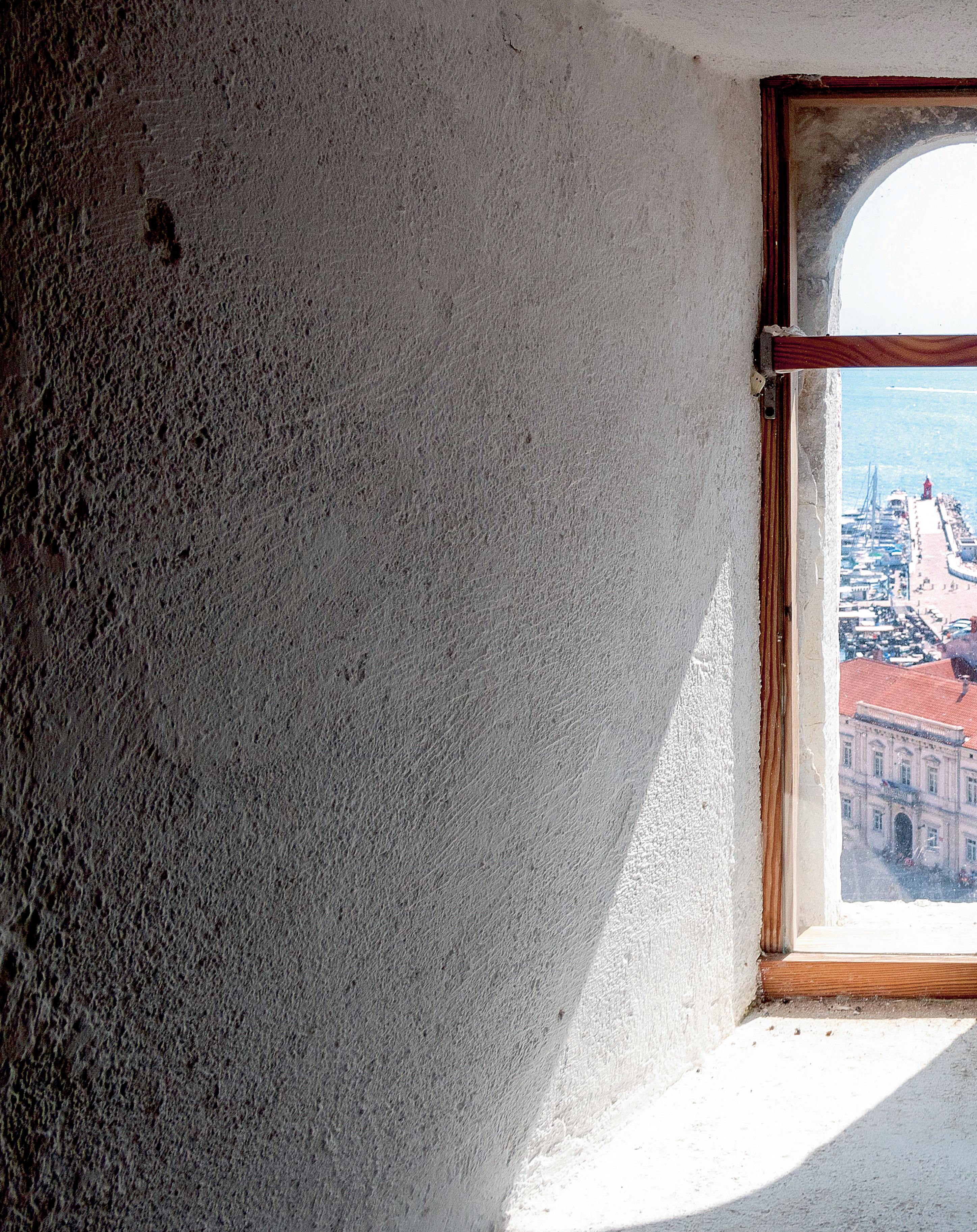
View through an arched window at St. George's Parish Church in Piran, Slovenia
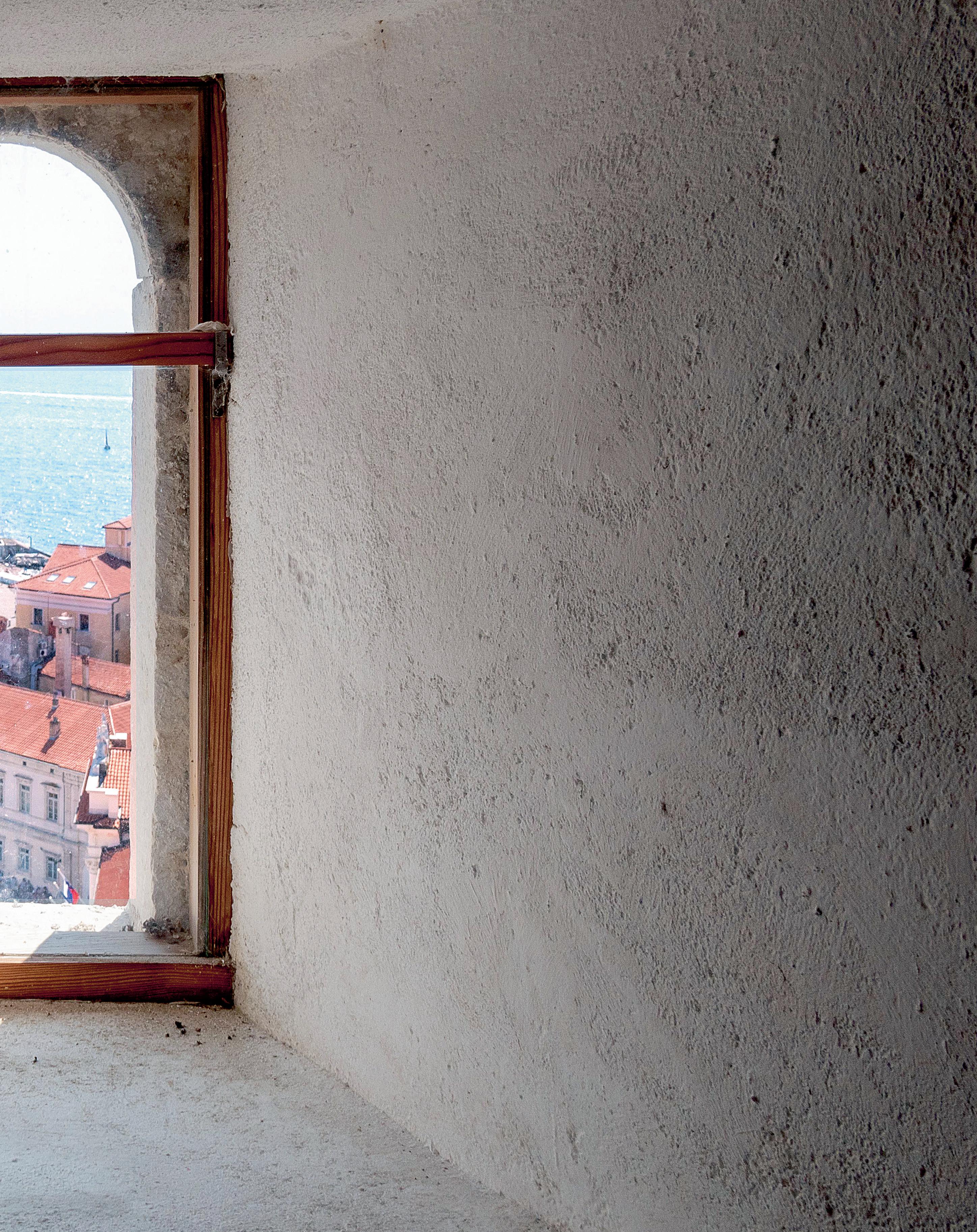
06 COMMENT Long-Haul Champions
08 MATJAŽ HAN
Slovenian Minister for the Economy, Tourism and Sport Fostering Cooperation
10 H.E. DAMJAN BERGANT Ambassador of Slovenia to Serbia Good Relations Despite Differences
14 BOGDAN GAVRILOVIĆ
Managing Director, WTO Serbia Transport and Logistics Without Borders
16 VESNA JOVANOVIĆ
Director, EurologSystem Connecting Italy and Serbia by Rail
18 PETER GRK
National Coordinator For Western Balkans, Ministry Of Foreign Affairs Of Slovenia The EU Still Feels Like Home
EDITOR IN CHIEF Neda Lukić n.lukic@aim.rs
DESIGN
Slađan Radosavljević
Zoran Perović design@aim.rs
PHOTOS
Zoran Petrović
COPY EDITOR Mark Pullen
PROJECT MANAGERS Biljana Dević b.devic@aim.rs Mihailo Čučković m.cuckovic@aim.rs Nataša Novković n.novkovic@aim.rs
OFFICE MANAGER Svetlana Petrović s.petrovic@aim.rs
FINANCE Dragana Skrobonja finance@aim.rs
22 BRANKO MILIKIĆ
Business Development Director at Halcom Serbia Innovations in Digital Banking
CEO Ana Novčić a.novcic@cordmagazine.com
PUBLISHER Ivan Novčić i.novcic@aim.rs
PRINTING Rotografika d.o.o. Segedinski put 72, Subotica SLOVENIA 2024
Published by: alliance international media Prote Mateje 52, 11111 Belgrade 17, PAK 125806, Serbia Phone: +(381 11) 2450 508
E-mail: office@aim.rs; office@cordmagazine.com www.aim.rs; www.cordmagazine.com ISSN: 2560-4465 All rights reserved alliance international media 2023
The views expressed in this publication are those of the presenter; they do not necessarily reflect the view of publications published by alliance international media THIS PUBLICATION IS FREE OF CHARGE
04 SLOVENIA 2024
Contents
23 DRAGANA AŠIĆ RATKOVAC
Business Manager
Consulting & Tax
Advisor at Unija
Consulting d.o.o. Beograd
Our View of the Tax World and What’s Important
24 SAVA TODIĆ Organisational and Business Advancement Manager, Doja Winery In vino PANTHEON
Slovenia 2024
26 ALMA MAXIMILIANA KARLIN, 1889-1950 The Remarkable Life and Enduring Legacy
30 DANIJELA FIŠAKOV
President of the Slovenian Business Club We Will Outdo Ourselves
32 DECADE ANNIVERSARY OF SLOVENIAN FILM DAYS CELEBRATED
34 CELEBRATING 30 YEARS: THE TOUR OF SLOVENIA
36 SLOVENIAN BUSINESS CLUB ACTIVITIES
Bridging the Economies of Serbia and Slovenia
cordmagazine.com 05

The Slovenian business community has forged strong ties with the EU, with a significant portion of the country’s exports directed towards EU member states
06 SLOVENIA 2024 COMMENT

Long-Haul Champions
Despite political changes nationally, Slovenia has remained dedicated to EU values and continues to advocate strongly for EU enlargement, particularly to encompass the Western Balkans
Slovenia’s two-decade journey within the European Union reflects a consistent and unwavering positive approach to integration and cooperation. Since its 2004 accession, Slovenia has embraced EU membership as a central pillar of its foreign policy and national identity. This commitment is evidenced by various official documents, including the Basics of the Strategy of Foreign Policy of Slovenia and the Foreign Policy Declaration, which have consistently underscored Slovenia’s alignment with EU values and objectives.
One of Slovenia’s key foreign policy priorities has been its unwavering support for EU enlargement, especially in the Western Balkans. This commitment has transcended changes in government and political orientation, highlighting the country’s bipartisan consensus on the importance of EU membership for regional stability and prosperity. Slovenian leaders, regardless of their political affiliations, have consistently advocated for the swift integration of Western Balkan countries into the EU, emphasising the positive role of EU membership in promoting peace, security and economic development across the region.
At the institutional level, Slovenia has established mechanisms such as the Committee for EU Affairs within its National Assembly to facilitate discussions and decision-making on EU-related matters. These forums serve as platforms for deliberating issues related to EU integration, differentiated integration and the adoption of EU
regulations and policies. While there may be differences of opinion on specific policy approaches, there is a general consensus on the need for Slovenia to align itself more closely with the core of the EU and accelerate its integration efforts.
The Slovenian business community has forged strong ties with the EU, with a significant portion of the country’s exports directed towards EU member states. This close economic relationship underscores the importance of EU membership to Slovenia’s economic stability and growth. Slovenian companies prioritise research and development in order to remain competitive on the EU market, with support from EU funds that play a crucial role in driving innovation and technological advancement.
Slovenians show strong trust in the EU, with notable support for EU intervention in areas like security and defence (42%), migration and refugees (38%), and foreign policy (36%). Moreover, citizens value the impact of diverse EU projects, which range from infrastructure development to social initiatives targeting the improved wellbeing of various age groups.
Despite fluctuations in the public’s perception of the EU, as a result of economic crises and other challenges, Slovenians maintain a strong belief in EU integration and Slovenia’s role within the EU. And while there may be ongoing debates and discussions on specific policy issues, Slovenia’s overall commitment to EU membership and integration remains steadfast under the new government.
cordmagazine.com 07
Fostering Cooperation
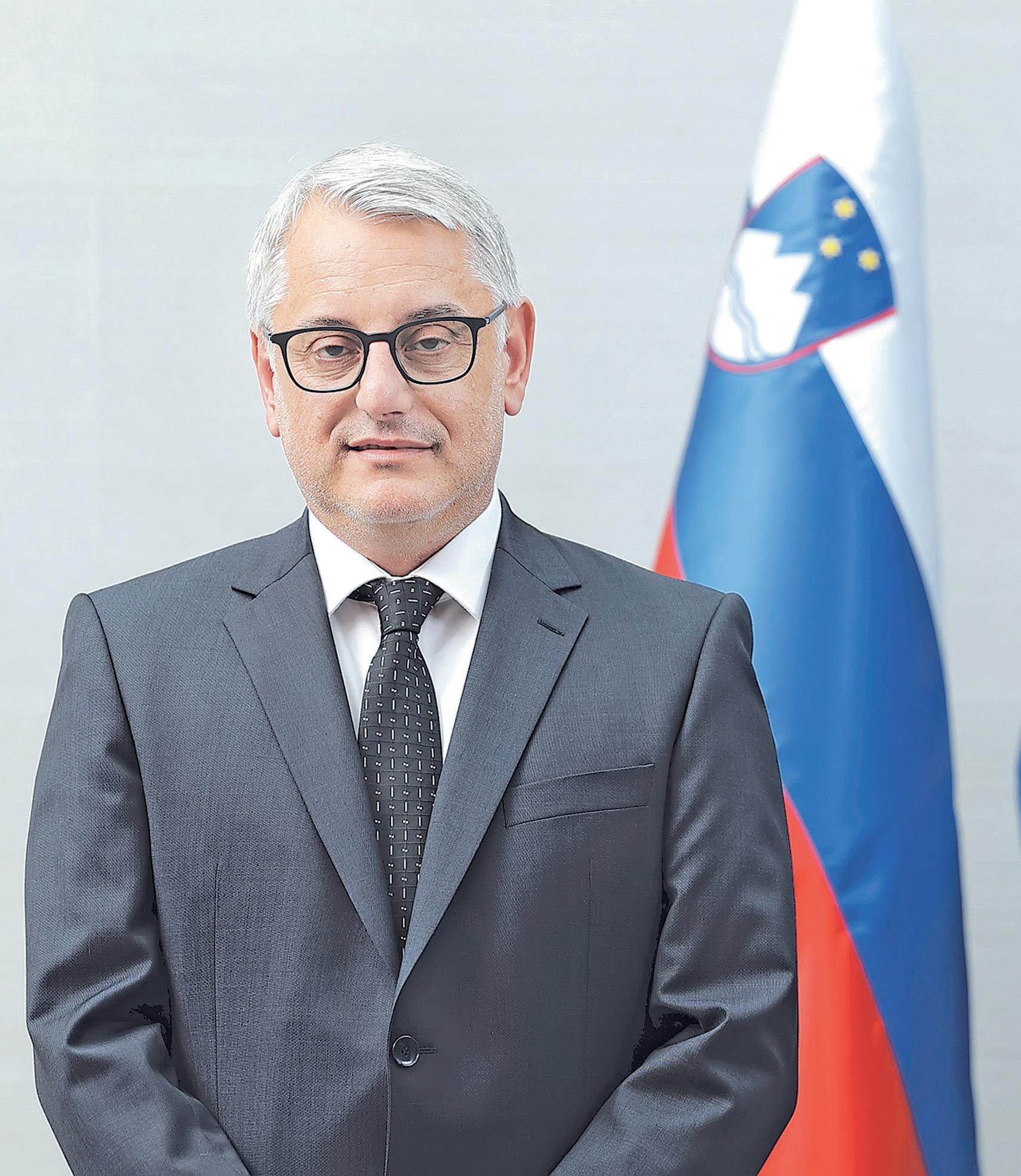
08 SLOVENIA 2024 INTERVIEW | MATJAŽ HAN SLOVENIAN MINISTER FOR THE ECONOMY, TOURISM AND SPORT
Photo Danijel Novakovič
World Expo 2027 certainly represents an exceptional opportunity for Slovenian contracting and service companies, especially in the areas of the sustainable development, infrastructure construction, tourism and event-related services, which can boost the volume of direct investments and further foster good economic cooperation between both countries
Commenting in this exclusive interview on economic cooperation between our two countries and the areas in which bilateral trade could be improved, Minister Han notes: “I would highlight the following areas, namely ecology, municipal and transport infrastructure, environmental protection, ICT, renewable energy, wastewater management and sustainable development. Those areas are all very important for future development. I also believe that both countries can further strengthen their economic cooperation in these areas.
Do you see the upcoming Expo2027 Serbia as an opportunity for the active participation of Slovenian companies; and how could it further economic cooperation between Serbia and Slovenia?
— We most certainly see this as an opportunity for the active participation of Slovenian companies. We particularly welcome Serbia’s plans to build the entire complex in a spirit of sustainability, ensuring that the exhibition venue will not only be for this one-off event, but will live on and develop beyond the expo. Furthermore, the specialised World Expo 2027 is certainly an exceptional opportunity for Slovenian contracting and service companies, especially in the areas of sustainable development, infrastructure construction, tourism and event-related services, which can boost the volume of direct investments and further foster good economic cooperation between our countries.
In which sectors do you believe economic cooperation between Serbia and Slovenia could be further enhanced, particularly in terms of investments?
— I would highlight the following areas, namely ecology, municipal and transport infrastructure, environmental protection, ICT, renewable energy, wastewater management and sustainable development. These are all areas that are very important for future development. And I believe our two countries can further strengthen their economic cooperation in these areas.
What are the main areas of interest for Serbian companies in Slovenia and vice versa, espe-
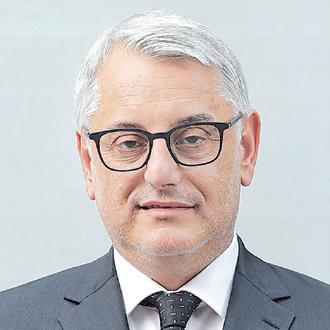
TRADE
Serbia was Slovenia’s 11th largest trade partner in 2023 and its 8th most important export market
GOODS
Bilateral trade in goods between Serbia and Slovenia in 2023 reached a total value of 2,051 million euros
VALUE
Goods worth €1,266 million were exported from Slovenia to Serbia in 2023, while goods imported to Slovenia from Serbia were worth €785 million
cially in the context of increasing bilateral trade and investment?
— According to data, the main interests of Serbian companies in Slovenia are represented by the fields of ICT, real estate and hospitality, while Slovenian companies in Serbia mostly focus on insurance, banking and industrial sectors, including automotive, machinery, chemicals, metals, food, furniture, textiles and pharmaceuticals.
Could you provide an overview of the current volume of bilateral trade between Slovenia and Serbia; how do you envisage its development in the coming years?
The main interests of Serbian companies in Slovenia are represented by the fields of ICT, real estate and hospitality, while Slovenian companies in Serbia mostly focus on insurance, banking and industrial sectors
— Economic cooperation between our countries is traditionally good. Serbia was Slovenia’s 11th largest trade partner in 2023 and its 8th most important export market. The value of goods exported from Slovenia to Serbia in 2023 totalled 1,266 million euros, while goods imported from Serbia to Slovenia were worth 785 million euros. In total, the trade in goods in 2023 reached a value of 2,051 million euros.
As for future developments, particularly in light of measures to attract foreign investment to Serbia in strategically important sectors, which encompass a wide range of state aid and incentives, we estimate that, together with the reduction of inflation and the growth of private consumption, the volume of total trade in goods will increase even further in the future.
cordmagazine.com 09
Good Relations Despite Differences
Given the extent to which Borut Pahor would be an acceptable candidate to all – both the parties in the dialogue, and especially the EU – he could probably contribute to the resolving of open issues in the dialogue between Belgrade and Pristina. It therefore doesn’t matter whether Pahor comes from Slovenia or elsewhere, rather what’s important is what he can do to improve life in these lands ~ Damjan Bergant
By Ljubica Gojgić
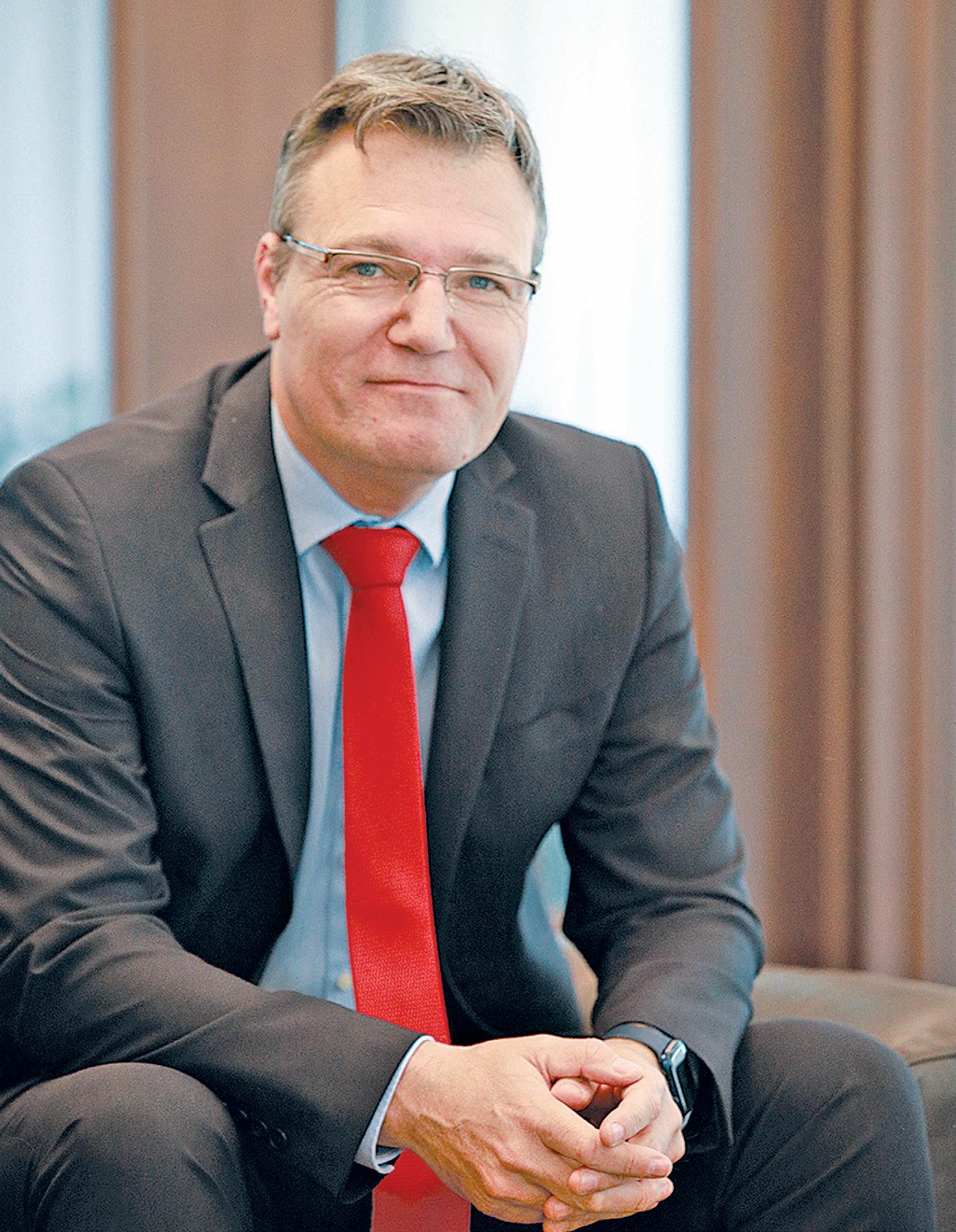
Despite serious differences of opinion regarding events in the wider region and around the world, which became evident with the opposing views expressed by Slovenia and Serbia during the vote on Kosovo’s membership in the Council of Europe and on the subsequent UN General Assembly Resolution declaring the Srebrenica massacre a genocide, Ambassador Damjan Bergant remains convinced that recent tension between Belgrade and Ljubljana shouldn’t threaten “joint action and cooperation”.
“I consider Slovenia and Serbia as countries that are bound by friendship and that both sides strive to deepen their bilateral relations,” says Ambassador Bergant. Speaking in this interview for CorD Magazine, he confirms that Slovenia will support the candidacy of its former president, Borut Pahor, to succeed Miroslav Lajčak as the EU’s mediator in the dialogue on the normalisation of relations between Belgrade and Pristina.
Your Excellency, Slovenia is this year commemorating the 20th anniversary of its EU accession. Have citizens’ expectations been met when it comes to membership in the Union?
— I consider the decision of Slovenia and Slovenes to join the EU as being one of the best and most important decisions for Slovenia since the establishing of the Slovenian state. After Slovenia’s EU accession, the country and its citizens gained much more than they would have done if they hadn’t become part of the Union. The free movement of people and goods is just one segment that’s important for the country’s development. Other opportunities that were created with our inclusion in the EU family are particularly important. Joining the single currency and the Schengen area undoubted-
10 SLOVENIA 2024
INTERVIEW | H.E. DAMJAN BERGANT AMBASSADOR OF SLOVENIA TO SERBIA
ly marked the upgrading of everything. Opportunities opened up for us to utilise various EU funds that have contributed to the development of the country and to a better and higher quality of life for Slovenia’s citizens. Young people have more opportunities to study and acquire knowledge at a large number of European universities, especially through Erasmus programmes. They then return to Slovenia with that knowledge and thus strengthen the society and contribute to the country’s further development. The advantages of an open labour market have also been demonstrated in this context. EU accession also relaxed any tension formerly felt at borders with neighbouring countries. I can say that the areas along the border with Italy, particularly Trieste and the countryside around Trieste and Goriška, have been reinvigorated. The side of the border that you live on is no longer important, rather what matters is quality of life, progress and mutual coexistence. The life of Slovenia and Slovenians has simply become more beautiful, more affordable and more advanced. And this is precisely why Slovenia will strive to preserve the EU, regardless of the critical situation around the world and the internal and external attempts to portray the European integration project as something negative that forces countries to partially sacrifice their own independence. On the contrary, EU integration represents one of the most tangible and positive integration processes in the history of humanity, which should also be nurtured in the future. Europe has been confronted by various crises throughout history, but these have primarily been threats to peace. It endured two world wars that left great scars on the lives of people and countries, but nonetheless succeeded in constructing an integration model that represents the shared values of democracy, the rule of law and the guarantee of human rights. In this regard, both EU citizens and member states have progressed, while the culture and identity of each individual country has been incorporated into the principles of European citizenship, the wide range of so-called official EU languages and the rich cultural heritage of Europe.
After the accessions of Slovenia and Croatia, a question remains as to whether and when EU enlargement will continue. The EU has recently also been focusing on Ukraine and Moldova as candidate countries. Viewed from the perspective of Slovenia – as a country that advocates strongly in favour of enlargement – should the priority be enlargement to include one of these former Soviet republics or the Western Balkans? — Enlargement is in the interest of the EU and its member states. It should also be in the interest of candidate countries, and their citizens in particu-
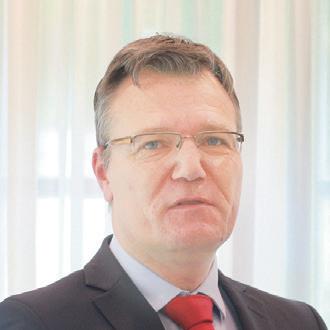
SREBRENICA
I would have been happier personally if the resolution had been adopted by consensus and if Serbia had participated in the process of adopting it in a different way
ENLARGEMENT
Convincing citizens that the EU doesn’t want enlargement and is to blame for nothing having been done on the part of the Union isn’t helpful for future membership
INVESTMENTS
Slovenian businesses invested approximately 161 million euros in Serbia over the previous year, according to which Slovenia ranks 7th among all foreign investors
lar. It isn’t important whether that means expansion to include the countries of the so-called former Eastern Bloc or the countries of the Western Balkans. Countries that want to become part of the EU will be able to join, though on condition that they are ready to accept EU rules. This is the foundation and expansion and membership won’t be possible without it. What is meant by rules? In particular, it means strengthening and implementing the system of democracy, the rule of law and human rights. In other words, it is about adapting national legislation to the EU acquis, and especially –and even more importantly – applying the rules and laws adopted. This is even more difficult than making rules. Likewise, there must also be a desire and inclination to really want EU membership among political structures, both those in government and the opposition, and especially among the citizenry indirectly. That desire must be expressed by public opinion. Convincing citizens that the EU doesn’t want enlargement and is to blame for nothing having been done on the part of the Union isn’t helpful for future membership. Any undue criticism of the EU by the political leaders of individual countries is unwarranted. Of course, the context of the European story changes and depends on the development of events, challenges and needs. The context of the process changes as a consequence, along with the recommendations and criteria. But if a country wants to become part of the EU family, it must conduct itself and live in accordance with EU values and rules. And those values and rules are primarily determined within the framework of the EU. No one should be forced to do something against their will.
In short, it is necessary to play with cards face up and to have a clear vision that must be clearly defended and presented. This is the only possible pathway to the goal. We will see which countries will be more successful in the future, whether those in Eastern or Southeast Europe. Serbia has every chance to become a member of the EU, and that depends solely on Serbia.
Relations between Slovenia and Serbia have been plagued by tension in the previous period. Serbian President Vučić dubbed the conduct of Slovenia’s UN representative towards Serbia as “abhorrent”. How would you comment on our bilateral relations?
— I believe that the words you mentioned cannot contribute anything positive to the development of good relations between our two countries. President Vučić realised that and apologised immediately, especially given that Slovenia – as a member of the UN Security Council – had nothing to do with the composition of the delegations attending the
cordmagazine.com 11
session and that it related to the UNMIK annual report. It also gave a balanced statement at the meeting. Slovenia performed its task correctly, which is why it is all the more surprising that the president said what he did.
Slovenia desires good relations with Serbia and I think our relations are good regardless of everything. We have some differing views on what’s happening in the wider region or what’s happening around the world globally, but that shouldn’t and doesn’t jeopardise our joint activities and cooperation. I consider Slovenia and Serbia as countries that are bound by friendship and that are both striving to deepen their bilateral relations.
At the time when the new Government of Serbia was just being constituted, I already received a request from the Cabinet of the Prime Minister of Slovenia to convey to Prime Minister Vučević an invitation to visit Slovenia as soon as the Government of Serbia is formed and to express Slovenia’s readiness to organise the next joint session of our two governments to be held in Slovenia by the end of this year. I forwarded this message to the prime minister informally when I had an opportunity to speak with him at the recent opening of the Krivača Wind Farm. We agreed on a formal meeting at which we will finalise the details. I presume that we will soon hold a formal conversation on this topic. In our informal conversation, Prime Minister Vučević emphasised that he would be happy to come to Slovenia and that the Government strongly welcomes the proposal for a joint session. He reminded me that the last meeting of this kind was organised in Novi Sad in 2019, when he was still the mayor of Novi Sad. In short, I want good relations and am convinced that we can do a lot on both sides by the end of this year to ensure the continuation of existing good relations between our two countries.
As ambassador of a country that is the sponsor of the UN General Assembly resolution on genocide in Srebrenica while at the same time being a great advocate for dialogue in the region, how do you view the fact that the text of the resolution was agreed upon without regional consultation and without the knowledge of both Belgrade and Banja Luka?
— It is difficult for me to comment on an issue about which I’m not specifically aware, or that I’m only aware of via the media. I believe that coordination in New York is necessary for the adoption of documents like UN General Assembly resolutions. Serbia is a UN member and had an opportunity to participate in the process of creating the resolution from the beginning, and later in the stage of revising the text. This is also indicated to a considerable extent by Serbia’s activities in New York, which were cov-
ered in detail by the Serbian media. Republika Srpska is part of Bosnia and Herzegovina and, as such, was included in the process of creating and adopting this resolution.
When it comes to the contents of the resolution on genocide that was adopted by the UN General Assembly, Slovenia considers the purpose of this resolution as facilitating reconciliation and empathy and building trust within Bosnia and Herzegovina. This is the point at which our views differ from those of Serbia. The genocide in Srebrenica has been acknowledged by two international courts, and they are the International Criminal Court and the International Tribunal for War Crimes in the former Yugoslavia. The purpose of this resolution was not – as has been highlighted in Serbia in particular – to accuse any nation of having commit-
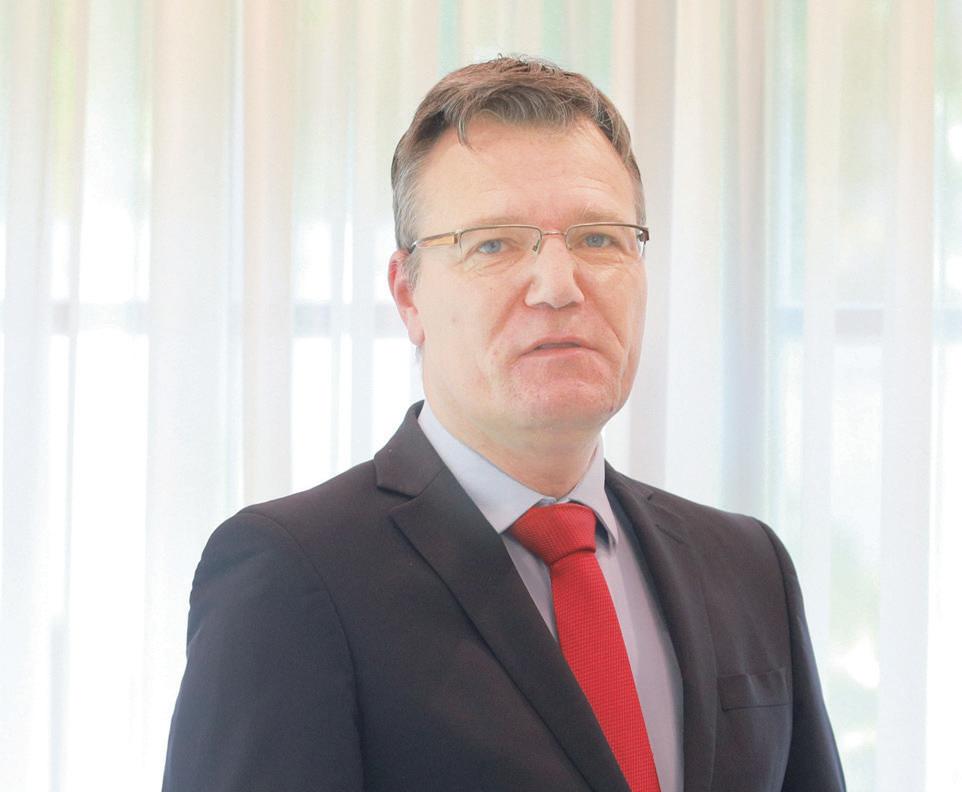
ted genocide in any way, rather the precise opposite. Of course, I would have been happier personally if the resolution had been adopted by consensus and if Serbia had participated in the process of adopting it in a different way. Whatever the case, efforts must be exerted to ensure that this resolution really contributes to its goal and isn’t used for negative purposes that would lead to aggravating the situation in this region. Serbia in particular can contribute a lot to that.
How important for Slovenia is former President Borut Pahor’s candidacy to become the EU’s new mediator in the dialogue between Belgrade and Pristina, thus replacing Miroslav Lajčak? — President Pahor is a great aficionado when it comes to events in the Western Balkans. It was un-
12 SLOVENIA 2024 12
der his leadership that the so-called Brdo-Brijuni Process bore fruit and contributed a lot of useful elements to the region. This is among the rare forums that has included, and still includes, all the leaders of Southeast European countries. Given the extent to which Borut Pahor would be an acceptable candidate to all – both the parties in the dialogue, and especially the EU – he could probably contribute to the resolving of open issues in the dialogue between Belgrade and Pristina. It therefore doesn’t matter whether Pahor comes from Slovenia or elsewhere, rather what’s important is what he can do to improve life in these lands. That’s why Slovenia intends to support the candidacy of President Pahor to succeed Miroslav Lajčak. If his candidacy proves successful, we will be happy and will give him our full support, just as we would support anyone else appointed to this position.
Slovenia and Slovenian companies invested significantly in the Serbian economy in the previous period and topped the list of foreign investors. If our impression isn’t mistaken and that position has now been occupied by others, which areas would you highlight as the best example of our economic cooperation?
— Slovenia remains among the countries whose
companies invest in Serbia. Slovenian businesses invested approximately 161 million euros in Serbia over the previous year, according to which Slovenia ranks 7th among all foreign investors and 3rd among investors from EU countries. Of course, as a country of just two million inhabitants, it is difficult to compare us with large countries. However, if we view investments in relation to the investor countries’ GDP, Slovenia still ranks top. There is actually a large investment of Slovenian capital or a Slovenian company in Serbia almost every year. We ranked top in terms of investments in 2020, with NLB’s acquisition of Komercijalna Banka. Then, two years ago, the Hrastnik glass factory bought the Paračin glass factory, again marking an investment of several hundred million euros. We saw the opening of the wind farm in Krivača this month, which is half owned – alongside the MK Group – by Slovenia’s Alfi Renewables investment fund. And this once again marks an investment of almost one hundred million euros of Slovenian capital. In short, Slovenia is and will remain an important investor in Serbia. When it comes to future bilateral economic cooperation, we can expect intensive cooperation, but also new investments in the fields of renewables and energy efficiency, ecology, tourism, biotechnology and industry.

cordmagazine.com
Cord - 210x132mm
obreza.pdf
sa 3mm
1 5/23/2024 12:37:04 PM
Transport and Logistics Without Borders
World Transport Overseas is one of the fastest-growing logistics companies in Eastern Europe, with branches in Bulgaria, China, Croatia, Greece, Kosovo, North Macedonia, Serbia, Slovenia and Taiwan
WTO’s policy is focused fully on meeting and exceeding all client requirements in the field of transport and logistics, and on providing additional services related to this activity. The company can this year boast of having new offices and receiving a valuable international accolade.
World Transport Overseas – Winner at the Forbes Business Awards 2024. Does this accolade confirm that you are on the right track?
— We are excited to announce that the WTO Group has been awarded the prestigious Forbes Business Award for services for 2024, repeating our success of 2020. The award received by WTO Bulgaria CEO Svetlin Pešev confirms our commitment to business and innovations in the logistics sector.
We express huge thanks to our dedicated team, whose hard work and perseverance made this possible. We are also immensely grateful to our clients and partners for their continued trust and
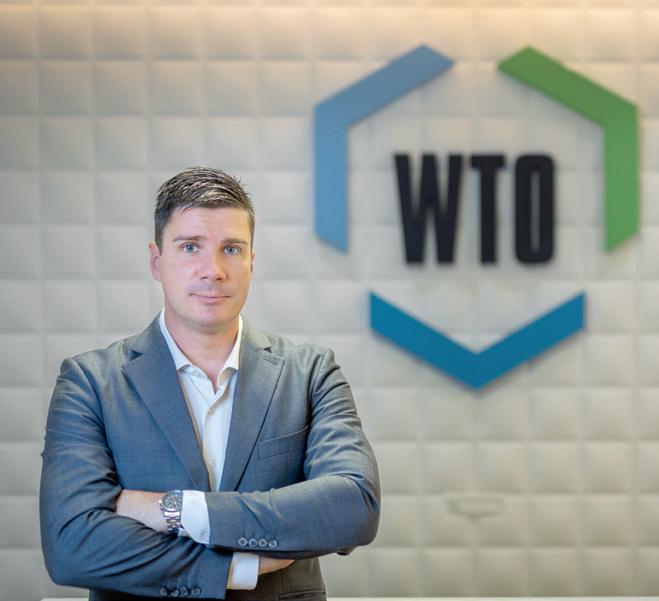
support. This award motivates us to continue pushing boundaries in transport, logistics and supply chain solutions, ensuring a top-notch service that meets our customers’ dynamic needs.
WTO opened a branch in China in 2020 and offices in Skopje and Thessaloniki in 2021, as well as in Pristina and Piraeus in 2022... Are you stopping there?
— In line with our “Vision 2030” strategy at the level of the group, we have successfully advanced in accordance with
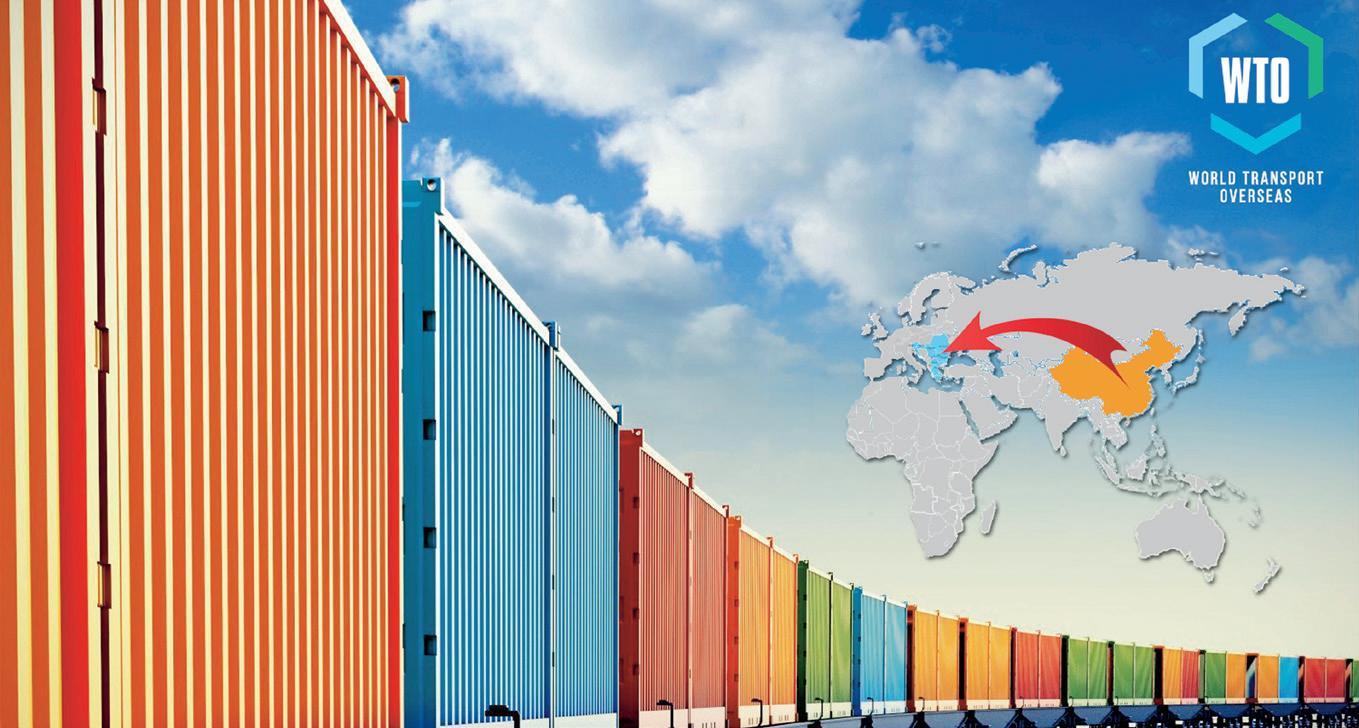
the strategy’s plan and opened new offices in 2024. In addition to the two previously opened offices in China, in Shanghai and Ningbo, we have successfully opened new offices in Shenzhen and Chongqing. Chongqing is particularly interesting because of its railway connections towards Europe.
Besides the aforementioned offices in China, we also have a newly opened office in Bosnia and Herzegovina, specifically in Sarajevo, headed by our dear colleague and great expert in logistics and transport, Vladan Kuharević. We expect very good results and exceptionally good future intercompany cooperation, and the joining of this office signifies a significant expansion of the WTO Group, which now employs over 300 staff at 25 locations across 12 countries.
New offices aren’t the only thing you can boast of… Don’t you also have a new railway service?
— It is with great pleasure and pride that we introduce our new LCL railway service from China directly to Belgrade, which covers all Balkan countries. This solution is unparalleled on the market of Southeast Europe! Our new consolidated railway service from China includes numerous advantages, including a direct connection, as the train from Xi’an to Belgrade operates non-stop on a weekly service basis and a fast transit time – transport from the Xi’an railway station to Belgrade takes only 21 days. Among the most significant advantages of this service is cost-effectiveness, as the costs are significantly lower compared to air transport, which has a competitive transit time, not to mention the reliability of the regular schedule provided by the regional leader in LCL business.
14 SLOVENIA 2024 14
CORPORATE | BOGDAN GAVRILOVIĆ MANAGING DIRECTOR, WTO SЕRBIA
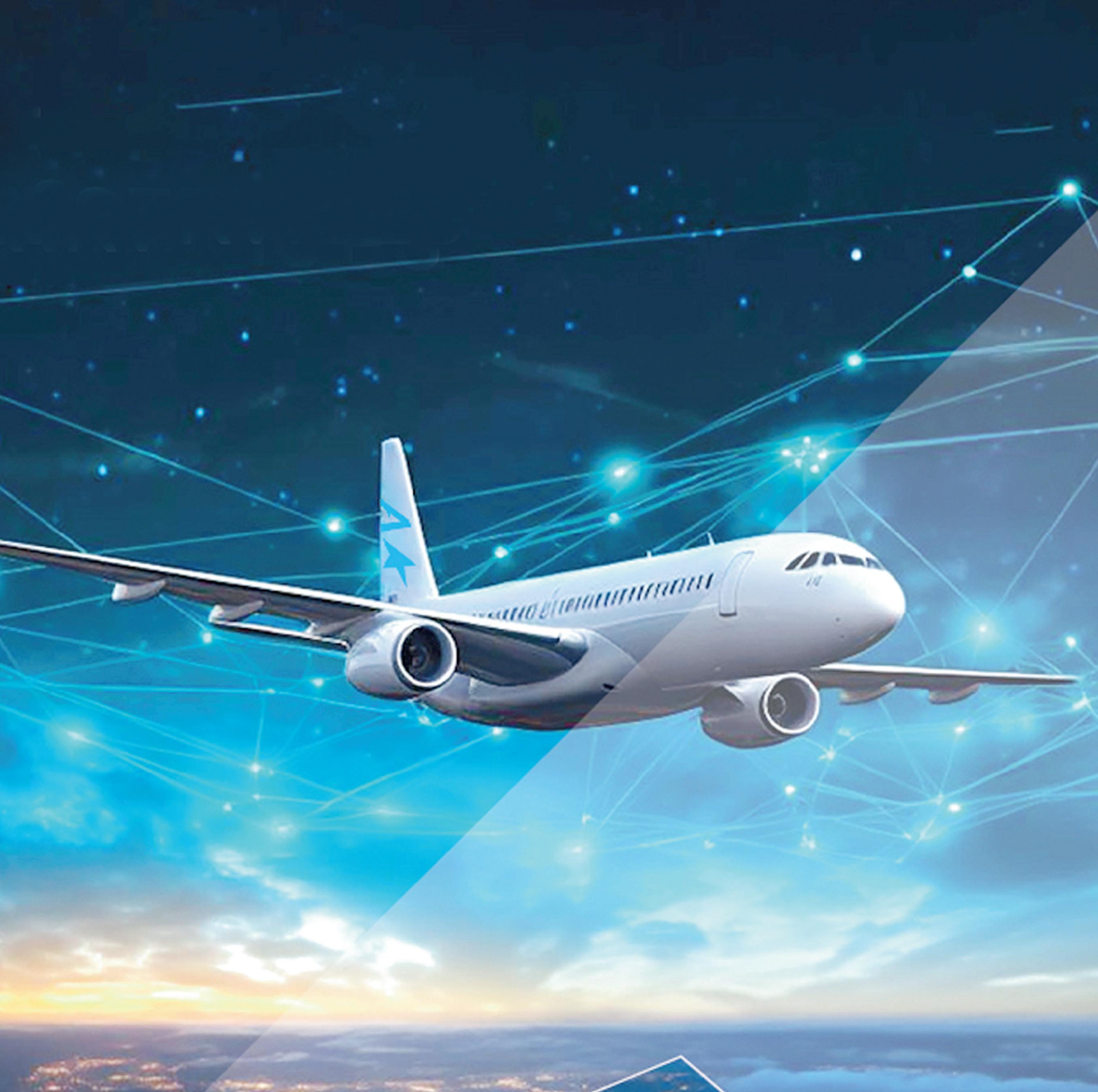
On call 24/7, 365 days a year, Avio Network quarantees specialized services ready for you.
Line Maintenance Part-145 Approved AMO
Aircraft treatments
With quick thinking and with expert knowledge, Avio Network is working on the aircraft to ensure an on-time departue!
Connecting Italy and Serbia by Rail
EurologSystem, which is set to commemorate two decades of successful operations in 2025, transports an average of 500,000 tons of goods annually, primarily agricultural raw materials and food products

In order to further stabilise our market positions and increase our competitiveness, we established Elsway Ltd. Ljubljana, a company in Slovenia that specialises in rail freight transport, announces EurologSystem Director Vesna Jovanović in this interview.
Who are your clients and which markets are in your focus?
— Our business revolves primarily around logistic support and creating conditions that enable the successful placement of our agricultural raw materials and products on the Italian market and markets in our immediate vicinity. Since the company’s establishment, our focus has been on rail transport of grains from Serbia to Italy. In addition to organ-
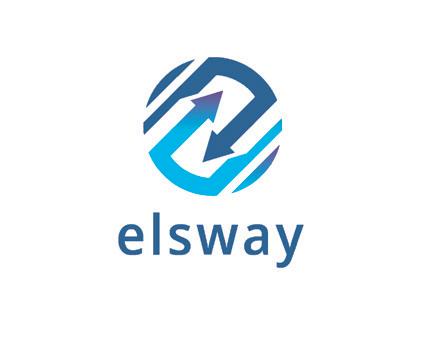
freight transport. It is directed towards the Central European market, Italy, and the Port of Koper.
Our clients are large Italian companies that, over 20 years of collaboration, have become known as examples of successful family businesses with traditions spanning several generations. These businesses also keep pace with contemporary trends and achieve rapid progress on European and global markets.
You entered the logistics field from the IT sector. Has this enabled you to offer modern business solutions and applications for transport companies and carriers?
— I switched from jobs related to high technologies and computer communications to those organising goods trans-
Our MyELS and iELS business apps are evolving and being supplemented with new modules, just as our company is undergoing change
ising international rail transport, we have also provided wagon capacities for the past eight years and, through a strong partnership with rail operators, offer an efficient and economical service along the transport route.
In order to further stabilise our market positions and increase our competitiveness, we founded Elsway Ltd. Ljubljana in Slovenia, which focuses on rail
port. I utilised my experience in designing and programming business solutions and, with the support of colleagues from both sectors, implemented a business application that fully monitors business processes in goods transport. Other companies involved in organising rail transport have also adopted this application. Our business apps, MyELS and iELS, are evolving and are supplemented with new
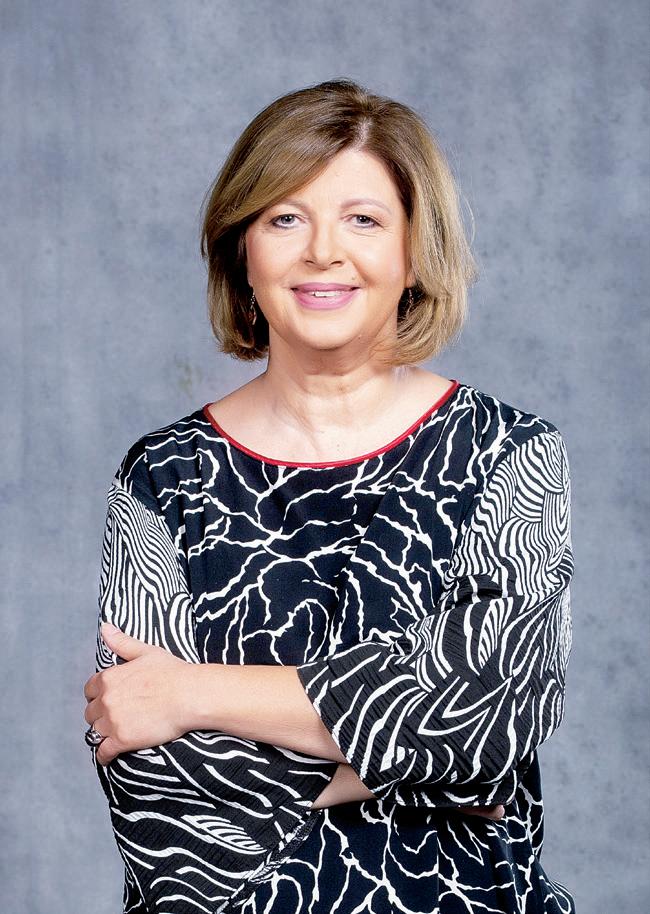
modules, just as our company is also undergoing change.
You are the second generation in the company, the “keeper of the flame” for the third generation that will continue to develop the family business? — Tragic life circumstances compelled me to take over the management of the family enterprise, and a lack of conventional education in transport, traffic and economics was compensated through practical experience. My father, Danilo Mrvošević, founder of EurologSystem and a “veteran railwayman”, was a great pillar of support and role model. As I advocate that everyone should do the job they are educated for, I consider myself the “keeper of the flame” for the next generation that is being educated and prepared to lead the company.
My family is involved in both companies. My husband handles fleet management, my son has been working at the company for three years and, after going through operational roles, is preparing to take on a managerial function, and my daughter is pursuing a master’s degree in international economics. They have been involved in the company’s operations in various ways and have attended important business decision-making sessions since childhood. They are now participating in the creating of new business opportunities and shaping an environment that will be tailored to them.
16 SLOVENIA 2024 16
CORPORATE | VESNA JOVANOVIĆ DIRECTOR, EUROLOGSYSTEM


GRAH Automotive has 20 years of experience in development and production of automotive parts. Our portfolio and know-how is constantly growing. In our production plant in Serbia, new products and technologies are developed that are used all over the world.
EMS Solution
SMT Production Lines
THT Production Lines
Assembly with possibility to do complete products and box builds
FLEXIBILITY DRIVES SUCCESS
www.grahgroup.rs
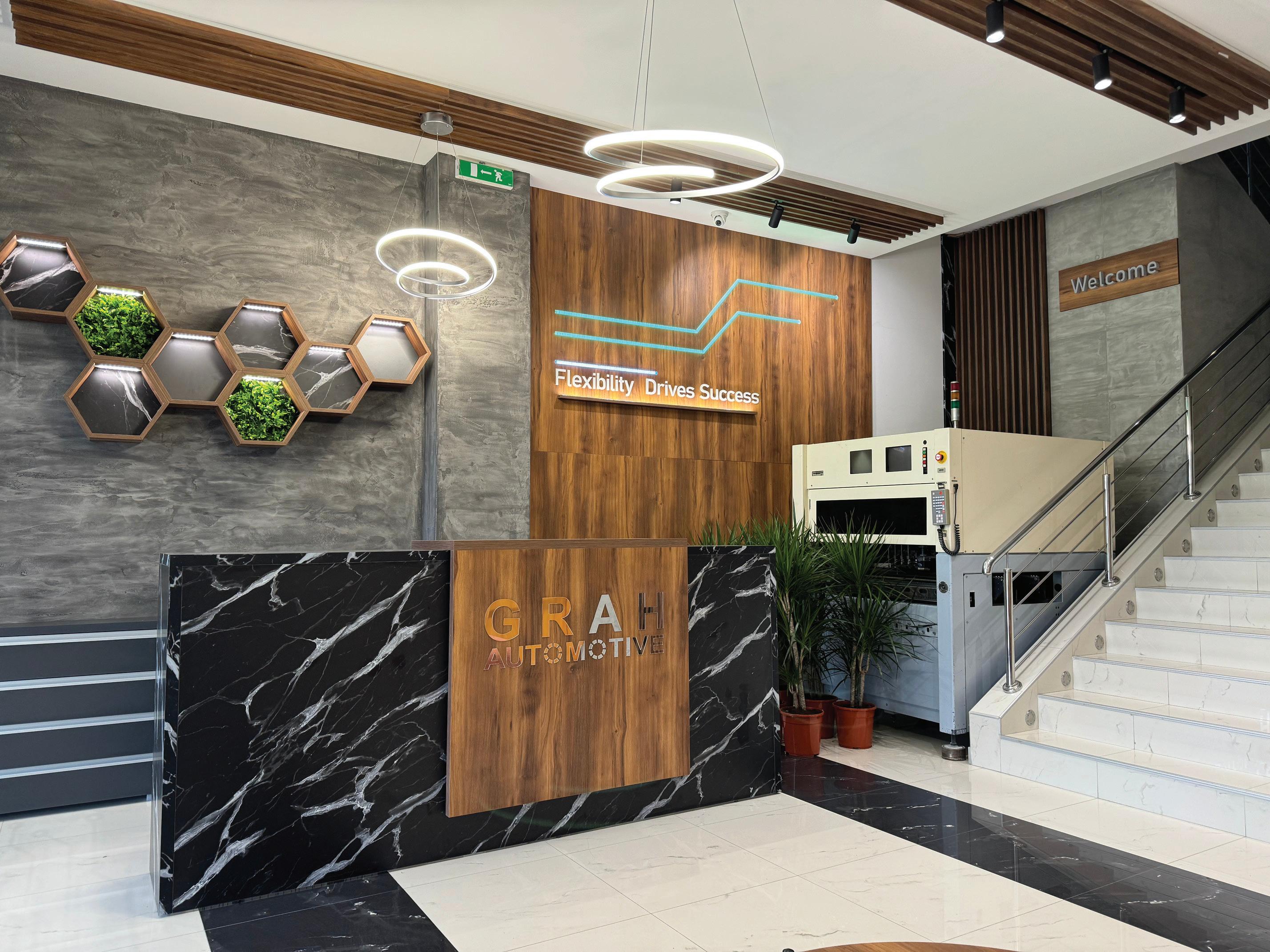
Expertise – Local Presence
Turn your Invoices into PAYMENTS with PRO KOLEKT!
Pro Kolekt is a globally recognised leader in out-of-court receivables management and credit rating information. We have successfully recovered over €73 million for almost 1,600 clients, monitoring over 20,000 European companies. Our Direct Markets: Slovenia, Serbia, Montenegro, Bosnia, Croatia, N. Macedonia, Romania, Bulgaria, and Albania.
A New Era of Excellence! Since 2023, Pro Kolekt has been a part of Atradius Collections, a global leader in debt collection and receivables management. This partnership enables us to extend our services worldwide.
Why Choose Pro Kolekt?
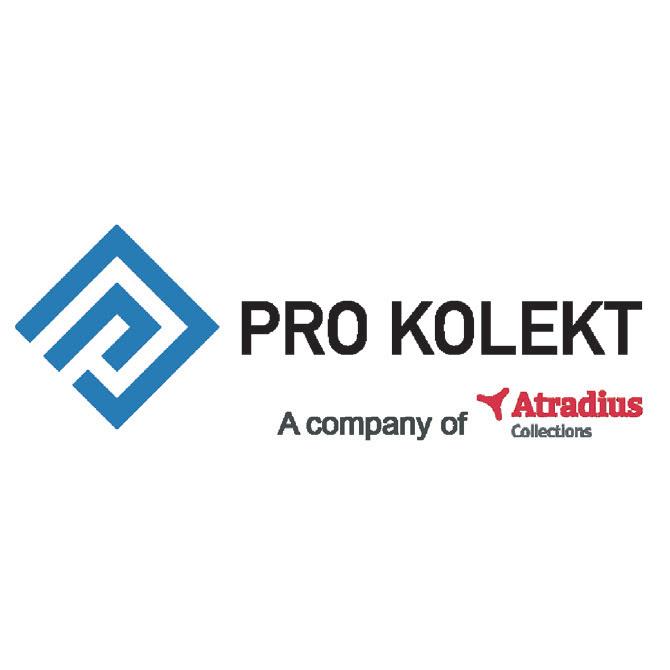
Focus on Your Core Business: Leave receivables management to us. Professionalism and Expertise: Trusted service. No Collection, No Fee: Risk-free engagement. Credit Reporting and Monitoring: Minimize your business risks. Let Pro Kolekt streamline your receivables and safeguard your financial health.
Contact us today!
PRO KOLEKT d.o.o. Beograd, Makenzijeva 37 +381 11 2402870/ office@prokolekt-serbia.com / www.prokolekt-serbia.com

Wi re H arnes s P ro d uc t i o n P ro d uc t d ev el o p ment and o p t i mi zat i o n T es t i ng eq ui p ment d es i gn and d ev el o p ment A ut o mo t i v e c o re- t o o l s cordmagazine.com 17 Global
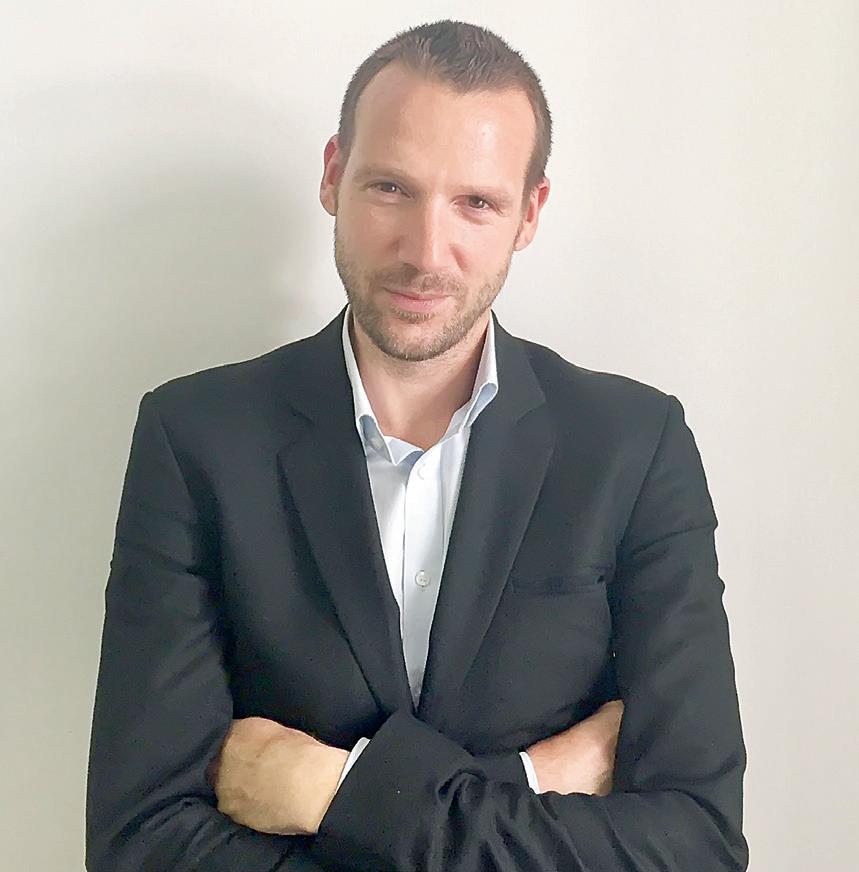 Peter Grk National Coordinator For Western Balkans, Ministry Of Foreign Affairs Of Slovenia
Peter Grk National Coordinator For Western Balkans, Ministry Of Foreign Affairs Of Slovenia
TThe EU Still Feels Like Home
The date of 1st May 2004 represented a day of hope and new beginnings, as Slovenia became a member of the European Union. We felt as though we’d finally arrived where we always belonged: in the family of democratic and liberal European countries, who share common standards, norms and values
he road to membership was long and, looking back, we would never have fulfilled this dream if EU accession hadn’t been treated as a national project, the biggest and most important one after independence. It’s worth underlining again that this wasn’t a project of political elites, but rather a project ingrained into all pores of society. It was driven by civil society and citizens, who understood the value and, ultimately, the necessity of being part of the most advanced and ambitious political project in the history of Europe.
Of course, we had our doubts and fears (like everybody embarking on a journey into the unknown), as we were a very young country that had
Slovenia recorded its highest ever annual GDP growth rates in the years immediately after joining the EU, when our economy began participating fully in the Single Market
just recently gained its independence, and the lessons learned/experiences from the past were still fresh in our collective memory.
After 20 years, it is appropriate to look back and attempt to analyze the impact EU membership has had on Slovenian society; on our economic, social, political and cultural development. In the following paragraphs, I will attempt to answer one simple question that everybody asks themselves, especially if they have been living together for a long time: would I do it again?
Personally, I certainly would do it again, and this feeling is still shared by a vast majority of
Slovenian citizens. Although the EU has gone through many crises over the previous decades and many questions have been raised about the ability of the Union to survive in the broader geopolitical context, the support of Slovenian citizens for the EU has always remained strong and unquestionable. Why?
Let’s start with the economy. By becoming part of the European Single Market, Slovenian companies gained access to around 450 million consumers, which was crucial to their growth and development. Slovenia recorded its highest ever annual GDP growth rates in the years immediately after joining the EU, when our economy began participating fully in the Single Market. To date, our per capita GDP has more than doubled compared to the year before accession: up from around €13,200 in 2003 to €27,000 in 2023.
By becoming an EU member state, Slovenia also became eligible for EU budget funding. Over the previous 20 years, more than 15.000 projects – infrastructural, business, educational, social, touristic or energy – have been implemented with the help of European funding. Between 2004 and 2023, Slovenia received €14.3 billion from the EU budget and paid €8.7 billion, meaning that Slovenia has received more than €4.7 billion from the EU budget over the last two decades.
In combination with the euro, cohesion funding and other support policies, this has brought progressive upward economic convergence and has steadily reduced the extent to which Slovenia lags behind older EU member states. The Slovenian standard of living rose from 78% of the EU average in 2004 to 90% of the EU average in 2022.
However, the benefits of EU membership go far beyond the purely economic.
18 SLOVENIA 2024 18
20 YEARS OF SLOVENIA IN THE EUROPEAN UNION
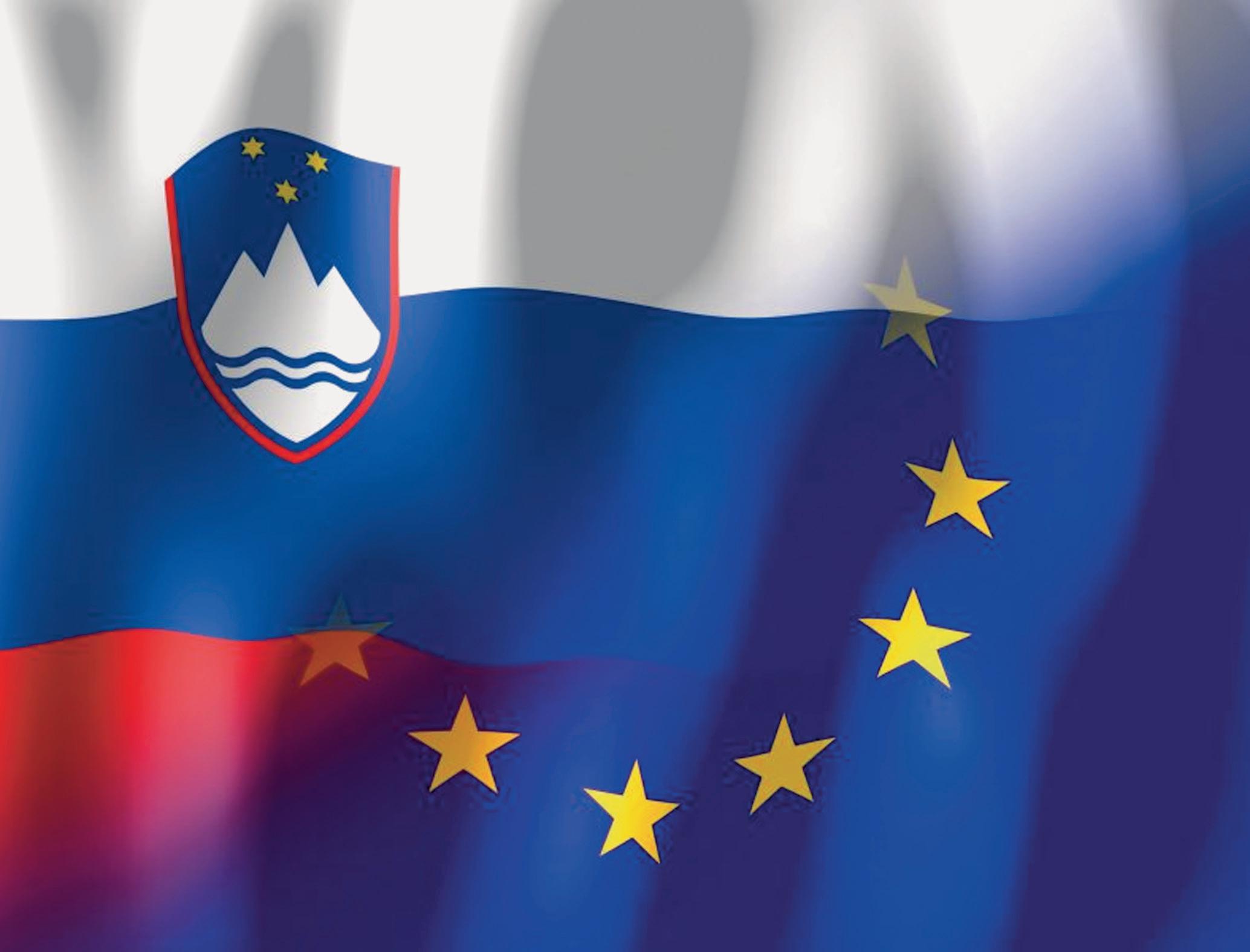
Membership enables our citizens to move, study or work freely throughout the EU, while goods, services and money can move almost as freely as they can within the borders of a single country.
Slovenian tourism has boomed since our country joined the EU. Slovenia recorded 15.6 million overnight tourist stays in 2022, which is twice as many as arrived in the year prior to EU accession. This has created new tourism sector jobs and revenue.
Every year, 2,200 Slovenian students and young people take part in Erasmus+, which gives them the opportunity to study or gain work experience abroad, enriching their education and giving them the chance to acquire valuable international experience.
Free mobility contributes to the transfer and exchange of knowledge and information, which in turn enhances human capital. We have improved our environmental standards and legislation, while the development of Digital Single Mar-
ket has extended the freedoms of the single market to the digital sphere.
EU membership also enables us to better tackle global challenges like climate change, migration, pandemics, security threats and political instability in our neighbourhood.
cordmagazine.com 19
DATA VOICE
MESSAGING SERVICES DATA CENTER SERVICES SYSTEM INTEGRATION & MANAGED SERVICES
Bul.
Beograd www.akton.rs info@akton.rs 381 11 4350 001
& VoIP
Akton d.o.o.
Mihaila Pupina 6/16
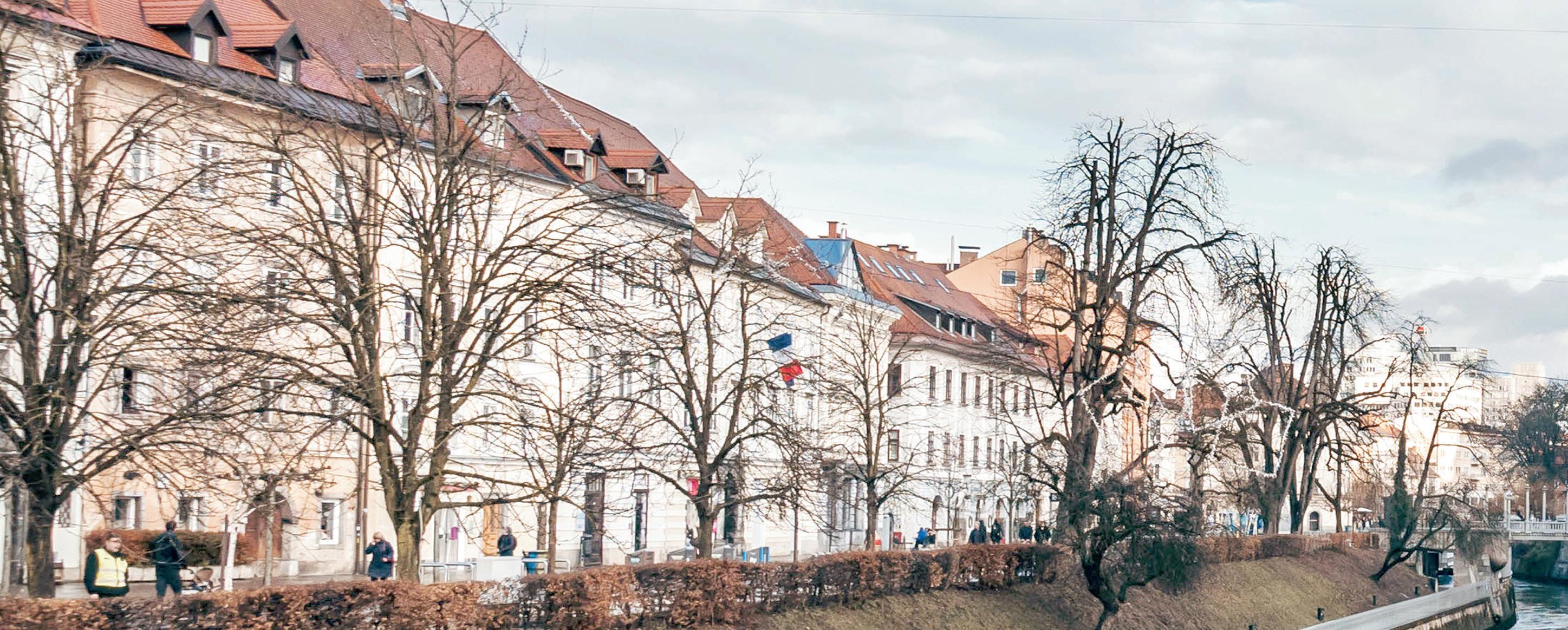
And finally comes something that I need to both underline and highlight: solidarity. The EU is a family in which solidarity is one of the most important values. Slovenia was hit by catastrophic floods last year, and the level of solidarity shown by the EU and its member states was unimaginable (for lack of a better word).
These are just a few examples that clearly show why we desired so strongly to join the EU and why we believe that only a strong, democratic and resilient European Union is capable of leading by example in the new global geostrategic environment.
WORK IN PROGRESS
The EU remains a work in progress. The Union clearly isn’t the same today as it was 20 years ago, when Slovenia joined the club. Decades of crises and a shifting global environment have left the EU with many questions over our common future. As a sui generis political project, the EU must evolve, adapt and change in order to thrive as one of the most important global actors in the new geopolitical reality.
Over the last 20 years, Slovenians have demonstrated that we are trustworthy, active and responsible partners within the EU, while our ambition is for the Union to grow, develop and integrate.
But what represents the building blocks of this new, more resilient, democratic, transparent and ambitious Union?
Let’s start with the most obvious policy, which was - and remains - the most successful
Enlargement towards the countries of the Western Balkans, which are already located at the heart of Europe, is a must and a geopolitical necessity
Slovenian standard of living rose from 78% of the EU average in 2004 to 90% of the EU average in 2022
tool to enhance democratic transition and economic development in Europe: enlargement. Slovenia believes that the EU cannot become a reliable and strong partner in the global international community without the final consolidation of the European continent. Now, more than ever, when the European neighbourhood is in flames and we have conflicts to the east and to the south of our territory, we need to make bold and geostrategic decisions that will bring countries with a European perspective closer to, and ultimately into, the European family. Russia’s aggression against Ukraine is a sad reminder of what happens when the EU fails to exercise its influence over its immediate neighbourhood. In this context, enlargement towards the countries of the Western Balkans, which are already located at the heart of Europe, is a must and a geopolitical necessity. Slovenia will remain among the most ferocious and adamant advocates of a swift and efficient enlargement process. That’s simply because we know what enlargement brings – both to the EU and to the accession countries. The aforementioned facts are more than evident.
Moreover, the EU needs to change in such a way that it becomes less dependent on external factors and more autonomous in critical areas like technology, economics, energy, defence and security. The EU needs to increase its own competitiveness, while at the same time preserving the
20 SLOVENIA 2024
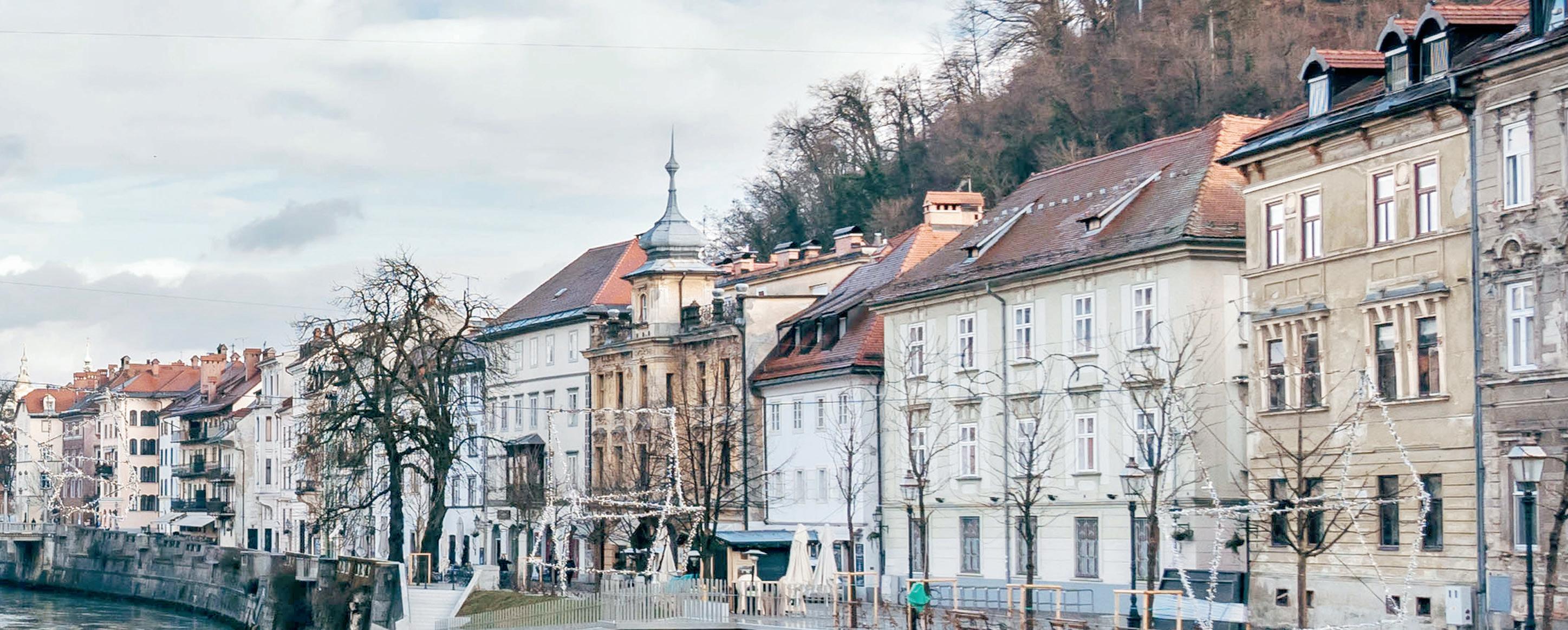
kind of social model that represents the backbone of our modern society.
Am I optimistic? Certainly! The EU has gone through many battles, crises and issues over the past 20 years, and despite many having predicted its demise, it is still here, and is more vibrant and resilient than ever. Slovenia is a proud member of the EU and is looking forward to the next 20 years.
By becoming part of the European Single Market, Slovenian companies gained access to around 450 million consumers

Innovations in Digital Banking
Halcom is a leader in the domain of digital banking and banking solutions. This company has spent 30 years enabling the safe and efficient digitalisation of financial processes for banks, companies and state institutions
Our role is to stay ahead of trends and provide solutions for our clients that are not only at the cutting edge, but also sustainable in the long run. Our desire is to hold on to our leadership position in the domain of digital banking and to continue expanding our portfolio of products and services, says Halcom Serbia Business Development Director Branko Milikić.
Halcom is a company that’s well known in the field of digital payments. Could you tell us more about your products and services?
— Our offer includes a wide array of products and services, such as solutions for e-banking, mobile payments and digital certificates. I would highlight in particular our Digital Journey platform, which enables banks and other financial institutions to provide users with a flawless digital experience.
Could you provide a more detailed explanation of how the Digital Journey platform helps banks adapt to today’s challenges?
— The Digital Journey platform is a key part of our business ecosystem, and integration with the Hal E-Bank solution enables banks to offer their clients a fully integrated and intuitive experience across all digital channels. It is de-
signed to help banks transform themselves into agile organisations that are capable of responding swiftly to changes to the market. Banks need to be both fast and flexible in today’s dynamic environment. Our platform enables banks to integrate new functionalities and products without the need for lengthy development cycles. In this way, banks –or more precisely digital banking sectors – gain a tool that enables them to react quickly to business opportunities
Mobile payments are becoming increasingly popular, while new technologies like AI are changing the way we think about financial transactions
and the needs of users, thereby ensuring their competitiveness and the satisfaction of clients.
How do you see current digital banking trends in Serbia and around the region?
— We see an ever-increasing need for the digitalisation of financial services, especially in light of recent global events, but also the ever-greater focus on a personalised customer experience. Mobile payments are becoming increasingly popular, while new technologies like AI are
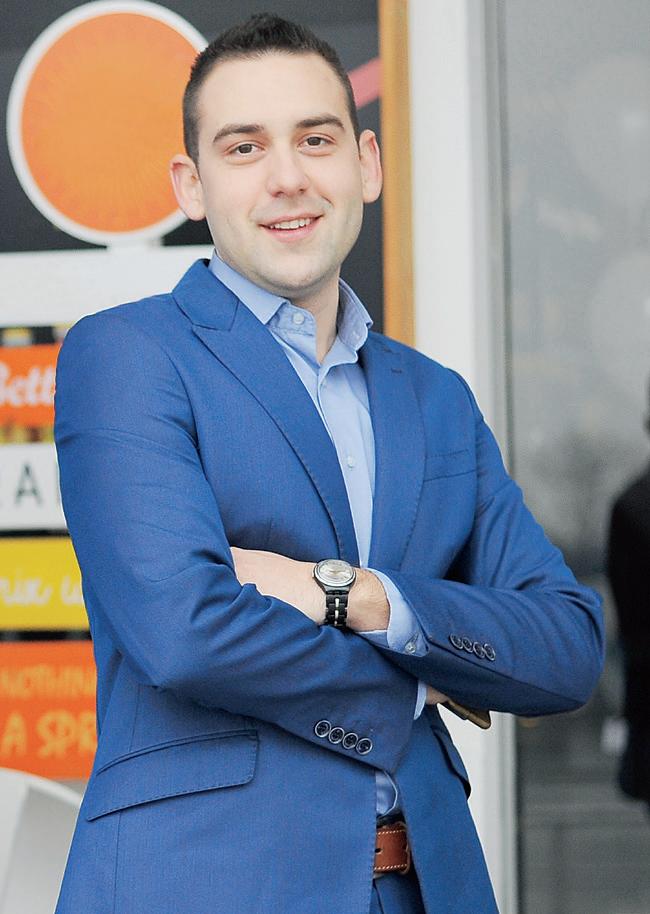
changing the way we think about financial transactions.
Could you tell us more about your “Halcom Br-AI-n” AI product and how it contributes to your solutions and future plans?
— Halcom Br-AI-n is our advanced AI product that utilises sophisticated artificial intelligence algorithms to analyse and predict user needs and behaviour. By being integrated into our solutions, including the Digital Journey platform and Hal E-bank, Halcom Br-AI-n enables banks to personalise their services and offers in a way that was hitherto unimaginable. For example, Halcom Br-AI-n can analyse user transactions, help users in their work with the e-bank or manage financial transactions. This not only improves the user experience, but also significantly increases the security of users and their trust in digital banking services.
What are your plans for the future of Halcom in Serbia?
— Our plans are ambitious. Our desire is to hold on to our leadership position in the domain of digital banking and to continue expanding our portfolio of products and services. We are likewise planning to strengthen our presence on the regional market and establish new partnerships with key players in the industry. Innovation lies at the heart of everything that we do, and we believe that’s the key to our long-term success.
22 SLOVENIA 2024 22
CORPORATE | BRANKO MILIKIĆ BUSINESS DEVELOPMENT DIRECTOR AT HALCOM SERBIA
Our View of the Tax World and What’s Important
The success of companies in today’s world depends, among other things, on the ability to adapt to constant amendments to tax laws. My experience tells me that regulations change quickly and that lifelong learning and adaptation represent a winning investment for every company. This can be a long and arduous process, but it is important for companies to realise the value of strategic tax planning and the proper structuring of their business.
Not all companies are the same and, as such, they don’t all need the same service and tax planning. Large and medium-sized companies often require a different approach. Unija Consulting, with its regional presence in six countries, offers advice that can significantly improve the operations of these types of companies.
Proactive tax planning is crucial to achieving long-term success. The key to the approach that we take at Unija Consulting is represented by personalised strategies that optimise operations and minimise risks.

Tips for successful tax planning:
Regular monitoring of legislative amendments: constantly monitor changes to laws in order to remain up to date with the latest rules and regulations. Tax optimisation: take advantage of all legal tax breaks and exemptions in order to reduce tax liabilities.
International taxation: plan global activities in such a way that double taxation is avoided.
Transparency and documentation: maintain detailed documentation in order to avoid misunderstandings with the tax authorities.
Where
our strength lies
A regional team and constant communication, as well as work with experts from around the region, enable us to keep abreast of the laws and legislative changes in the region, as well as the trends that await us, and to thus optimise the taxation element of our clients’ regional operations.
We additionally aim to facilitate our clients’ operations and save them time, so we are now able to offer “one-stop shop” services from the very first step of consulting, when it comes to choosing the best legal form for establishing a company, through the second step of providing company establishment services and the third step of establishing good accounting and tax setups that ensure the durability of business operations.
Transparency and education represent the foundations of our work. All our clients are able to rely on us as dependable partners in all of their tax challenges.

DRAGANA AŠIĆ RATKOVAC BUSINESS MANAGER CONSULTING & TAX ADVISOR AT UNIJA CONSULTING D.O.O. BEOGRAD
cordmagazine.com
In vino PANTHEON
It was in 2010 that the cultivation of grapes and production of wine became the core activity of family company Tody, which has existed for 25 years and saw its operations improve even further with the inclusion of the second generation in the business
Sava Todić, son of the founder of Doja Winery, who joined the family business immediately after graduating from college, introduced us to the software solution that he uses to integrate all important business processes –from accounting and bookkeeping, via warehousing, retail and wholesale operations, to servicing and production.
We know the most important thing about your wines – that they are excellent and we like them – but we don’t know much about your winery. Please familiarise us with Doja... — Doja forms part of family company Tody, which has existed for 25 years already. The winery is located in the Toplica wine region, where we have 42 hectares of vineyards that are dominated by autochthonous Serbian and local varieties Prokupac and Tamjanika, while the remainder is occupied by international varieties like Chardonnay, Cabernet Sauvignon, Merlot and Cabernet Franc.
Tody currently has a staff of 30 employees. Half of them work in production, while the other half are engaged in management, administration and sales. All family members are involved in the business, which is a characteristic of a true family business, and I joined in 2018, after completing my undergraduate studies at the University of Belgrade Faculty of Organisational Sciences.
Considering that many processes unfold within the framework of our company – from production to the sale of products – I am in a position to work on numerous different jobs. I started as a Key Account Manager, which implied maintaining and developing relations with systems of buyers in order to ensure lasting partnerships and profitability, then I gradually shifted increasingly to dealing

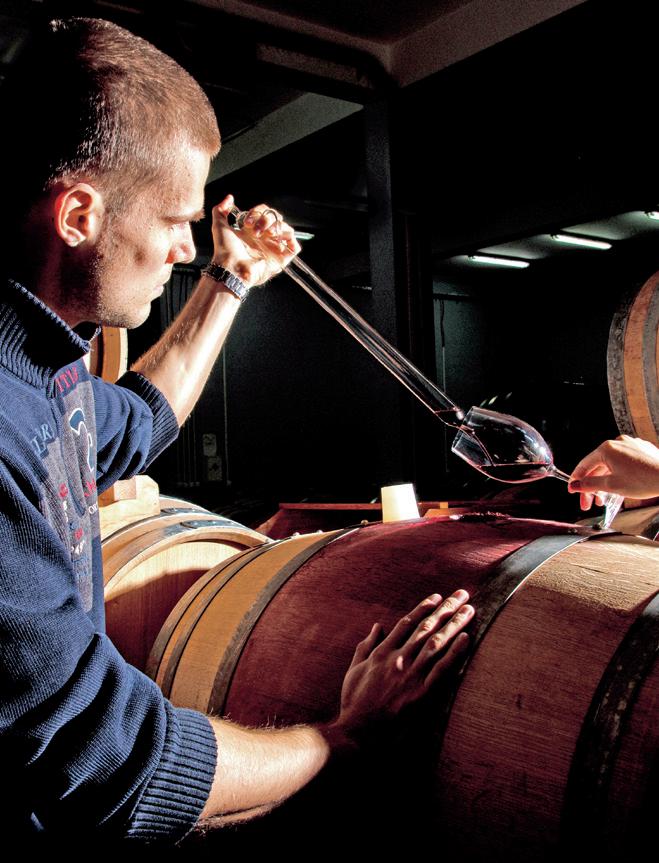
We conducted our operations throughout the whole of last year in PANTHEON, which for me is synonymous with order, orderliness, precision and systemisation
with finances, which is my primary interest in general.
When did the need arise to introduce an ERP (enterprise resource planning) software solution? Was it when you realised that it could help you automate business processes and achieve a competitive advantage?
— The process of producing wine lasts several years and it is very demanding to allocate to a given product all the costs (depreciation, energy, staff salaries and other costs) that arise during the production period. It was necessary to implement an ERP programme that would enable this, and PANTHEON was recommended to me in conversation with my accountant and business partners.
The database was ready for us to launch regular operations from the beginning of January 2023, while over the course of the subsequent few months, through its support, we solved problems that had arisen in the process of calculating the cost of production per grape, and then the cost of producing the wine. We solved the problems with work orders and monthly allocations of costs, while reports on production, sales, and expenditure factors were adapted to our requirements.
Are you satisfied with the solution and support? What is your overall impression of PANTHEON?
— I liked the clear and simple look of the program and the way it works, as well as the wide range of reports already generated. We conducted our operations throughout the whole of last year in PANTHEON, which for me is synonymous with order, orderliness, precision and systemisation, and we now have a clear approach to the cost per grape in the previous harvest, as well as the white wine that produced from those grapes. For the rest of the wines, which are currently aging, we will receive the cost per unit in the following period. PANTHEON has enabled us to arrive at a precise cost per unit, which is otherwise difficult to achieve in our production process and is essential for us to run the entire business well.
https://www.datalab.rs/
24 SLOVENIA 2024
CORPORATE | SAVA TODIĆ ORGANISATIONAL AND BUSINESS ADVANCEMENT MANAGER, DOJA WINERY
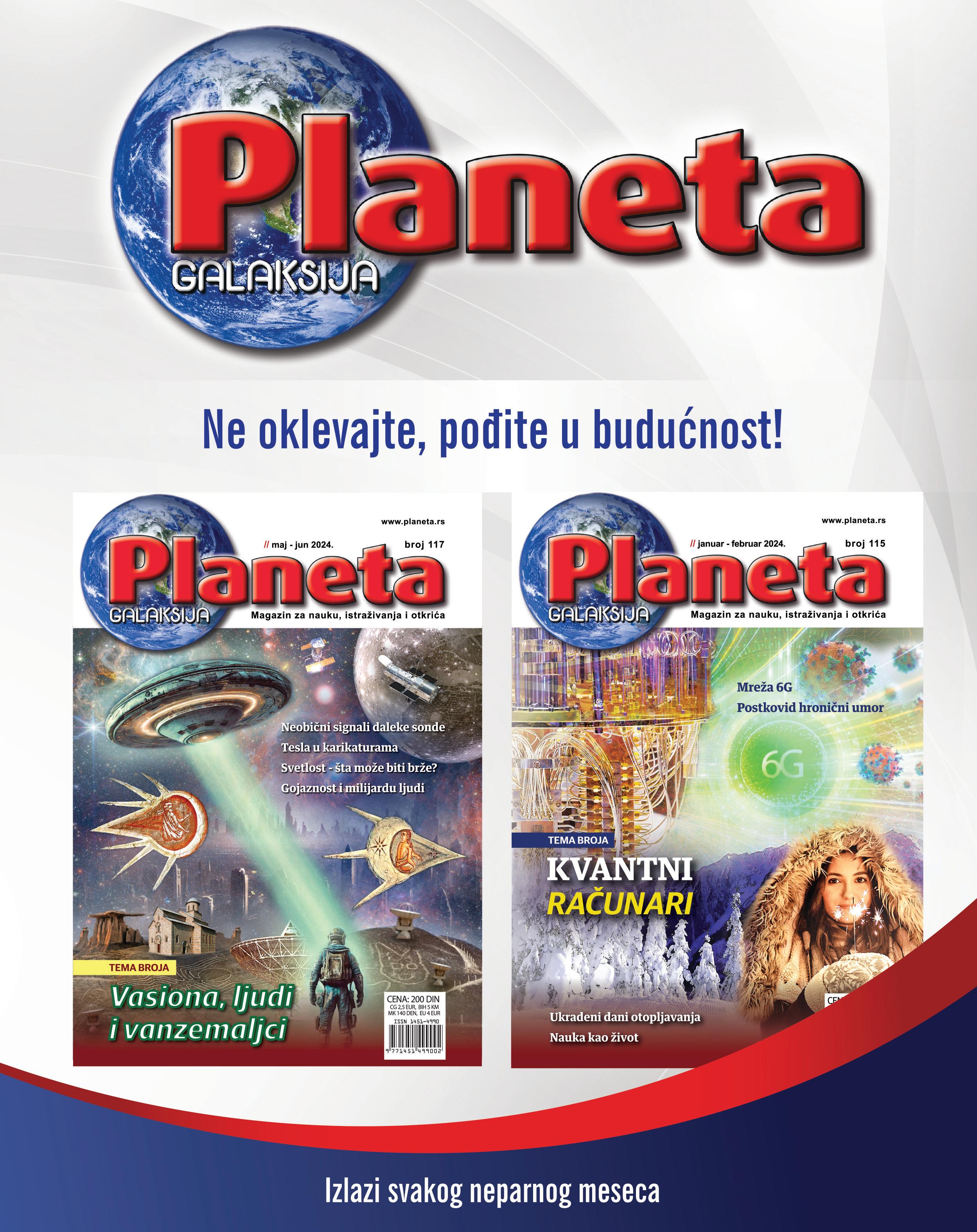

Life The and Remarkable Enduring Legacy
ALMA MAXIMILIANA KARLIN, 1889-1950

Have you ever heard of Columbus’ daughter? This is how the citizens of Celje referred to Alma Maximiliana Karlin, a Slovenian traveller, writer, poet, collector, polyglot, and theosophist. She was one of the first European women to circumnavigate the globe alone

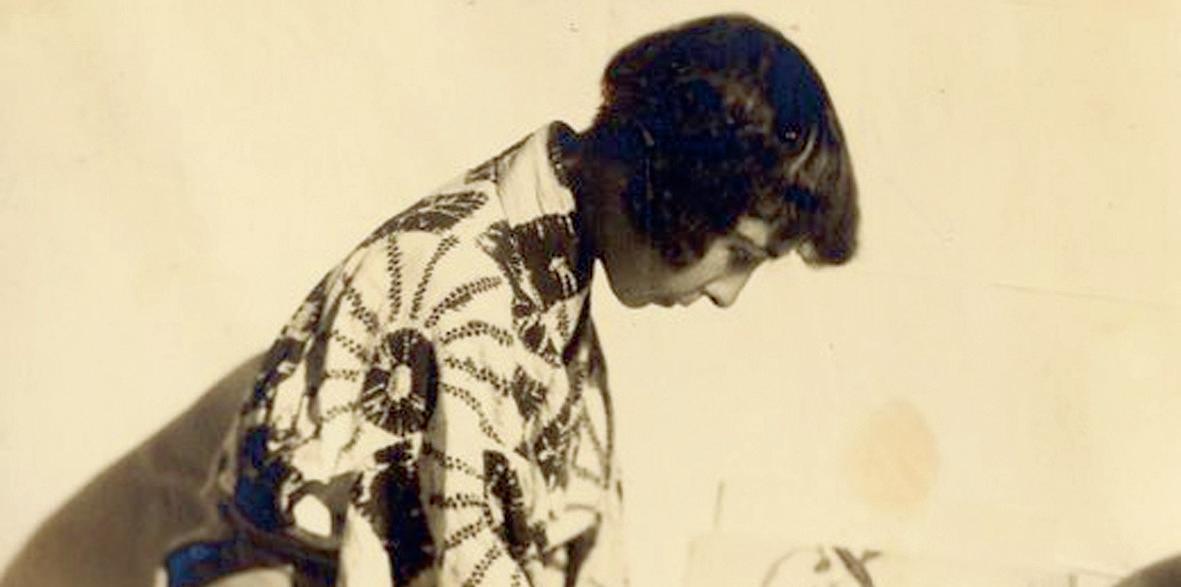
Alma Karlin lived her life with extraordinary independence and determination, despite numerous challenges and dangers. Unlike many of her contemporaries, she travelled without financial support. Setting off at the age of thirty, she encountered and overcame many obstacles. Her travel books, published during the interwar years, made her one of Europe’s best-known authors. However, her outspoken opposition to the Nazis and refusal to align with Communist demands led to her being largely forgotten.
CHILDHOOD AND ADOLESCENCE
Alma M. Karlin was born in 1889 in Celje, then part of the Austro-Hungarian Empire. Her parents were German-speaking Slovenians; her mother, a forty-five-year-old teacher, and her father, a sixty-year-old retired major of the Austro-Hungarian Army. Born with a low-
In London, she taught languages and immersed herself in the diverse cultures of her students, which sparked her desire to explore these cultures firsthand
ered left eyelid, Alma faced rejection from her mother from an early age. However, she shared a close bond with her father, who educated her with an emphasis on fortitude and independence. Tragically, her father died when she was just eight years old, leaving her at the mercy of her mother’s strict and often harsh upbringing. Alma’s mother tried to mould her according to contemporary social norms, but Alma resisted. Despite developing inferiority complexes due to her mother’s rejection, she grew into a brave and determined young woman. At sixteen, she realised that education was her key to economic independence and a way to break free from her mother’s influence. This insight drove her to leave Celje, a town rife with nationalistic
tensions between Germans and Slovenians, and seek opportunities elsewhere.
SETTING OFF INTO THE WORLD
At eighteen, Alma left her home for London, embarking on what she called a “voluntary exile.” In London, she taught languages and immersed herself in the diverse cultures of her students, which sparked her desire to explore these cultures firsthand. She excelled in learning languages, passing top of her class in exams for Norwegian, Swedish, Danish, English, French, Spanish, Italian, and Russian at the Royal Society of Arts.
The outbreak of World War I forced Alma to leave London for Norway and Sweden, where she discovered her passion for writing. In 1919, at the age of thirty, she returned briefly to Celje, packed her typewriter “Erika” and the ten-volume dictionary she had compiled, and set off on a global journey. She worked as a language teacher, translator, journalist, and travel writer. Despite facing financial hardships and lacking travel permits, she navigated numerous detours to reach her destinations, particularly Japan, which she longed to explore.
THE JOURNEY
Alma’s journey was anything but smooth. She travelled across South and North America, Japan, Asia, Australia, the Pacific Rim, and India. Along the way, she faced numerous personal challenges and life-threatening illnesses. Despite these obstacles, she continued her travels, documenting her experiences in her writings. Alma’s resilience and determination to overcome adversity were evident as she navigated through unfamiliar territories and cultures, often without adequate financial resources.
In Japan, Alma spent a blissful year filled with profound impressions. From Japan, she continued her travels, visiting various countries and immersing herself in their cultures. Her extensive travels and the stories she gathered enriched
28 SLOVENIA 2024

her writings, which became well-known in Europe and beyond during the interwar period.
DIFFICULT TIMES
Upon returning to Celje in 1927, Alma continued to write novels and travel books. Despite her literary success, she faced hostility and scepticism in her hometown. Her travel trilogy, published in Germany between 1929 and 1933, was translated into several languages and achieved international success. However, the rise of the Nazis brought severe repercussions. Her books were banned, and she was imprisoned as an enemy of Hitler’s ideology. Remarkably, she escaped execution thanks to a Gestapo officer who was a fan of her travel books. During World War II, Alma joined the partisans in 1944, but her movements were restricted, and she was constantly monitored. Her opposition to
the partisans ordering her liquidation, she managed to survive. However, she never returned to England, where she had hoped to spend the rest of her life. In post-war Yugoslavia, she was ostracised as a German-speaking writer and lived in poverty until her death from breast cancer in 1950.
LEGACY
Alma Karlin was a prolific writer, publishing twenty-four books, over forty short stories, numerous articles, poems, notes, and drawings. Her works were highly regarded in Central Europe, and her lectures attracted large audiences. Many of her travel books, novels, ethnological, and theosophical works were published between 1921 and 1938, some reaching print runs of over 80,000 copies and being translated into multiple languages.
She excelled in learning languages, passing top of her class in exams for Norwegian, Swedish, Danish, English, French, Spanish, Italian, and Russian at the Royal Society of Arts
Despite her financial constraints, Alma collected a variety of items during her travels. These collections include postcards, textiles, and her own zoological and botanical watercolour drawings. These artefacts offer a glimpse into her eight-year journey around the globe and her deep interest in the cultures she encountered. Alma’s contributions to literature and her adventurous spirit are commemorated in a permanent exhibition titled “Paths of Alma M. Karlin” at the Celje Regional Museum. In 2009, a documentary about her life, “Alma M. Karlin: A Lonely Journey,” was released, further solidifying her legacy as one of the most remarkable women of her time. Her story is a testament to her resilience, independence, and unwavering quest for knowledge and adventure.
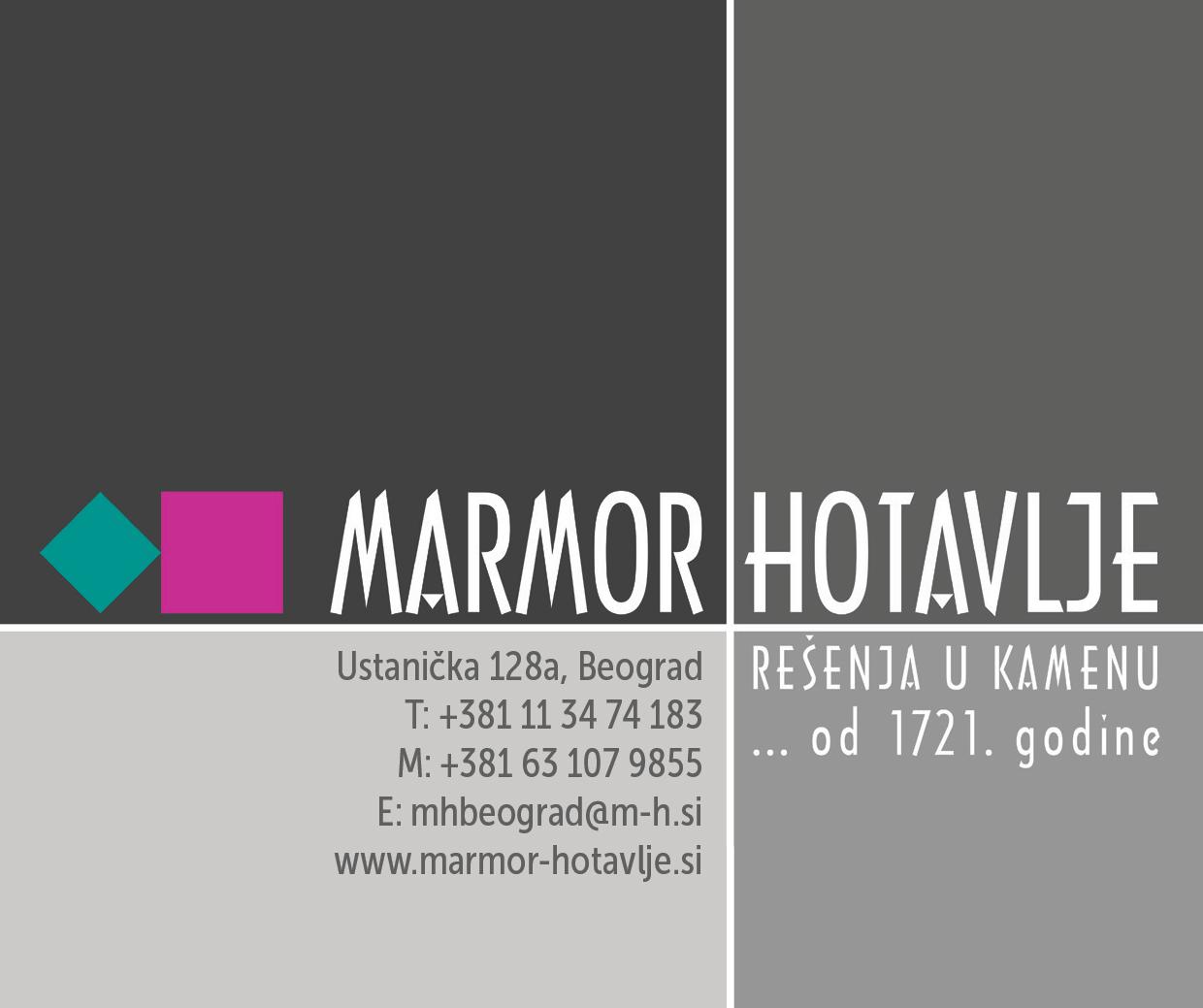

90 A (Skyline, apt. 115) 11000 Beograd Srbija tel: 011 / 711 69 85, 6143 390 e-mail: office@sekulovic-law.rs www.sekulovic-law.rs
Kneza Miloša
We Will Outdo Ourselves
The Slovenian Business Club will become an even stronger and more influential business player in Serbia, Slovenia and around the region, with a strong network of contacts and partnerships
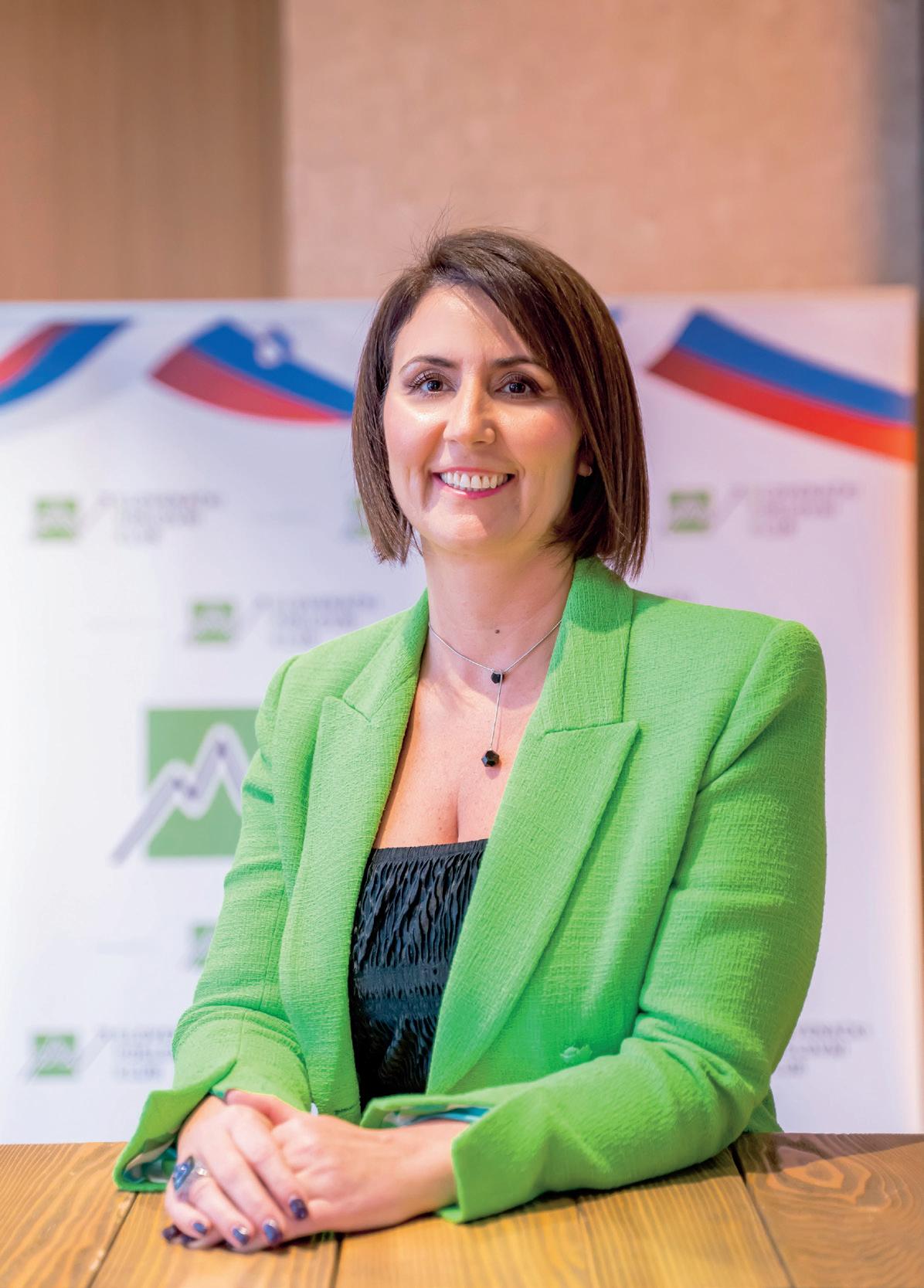
An entire generation of businesspeople has grown up since the founding of the Slovenian Business Club two decades ago. “Our membership today includes companies whose directors are the children of those directors who were at the peak of their power at the time of the SBC’s inception. That’s why this jubilee represents an impressive achievement,” says Slovenian Business Club President Danijela Fišakov in this interview.
Numerous parameters have contributed to the SBC’s durability and to its vitality, as well as the fact that it is constantly current. “Among these parameters, I would highlight dedication and maintaining operational continuity, as well as the constant engagement and support of members. In order to retain their support throughout this entire time, and to ensure their participation in the association’s work, the SBC set itself the imperative of constantly delivering new values to its members,” explains Fišakov.
Speaking in another interview 10 years ago, you criticised the lack of a financial culture in Serbia. What has changed for the better over these 10 years and what still concerns you?
— Improving the business climate in Serbia depends, firstly and undoubtedly, on the state’s attitude towards this issue and its focus on creating a favourable environment for doing business. Serbia has done a lot over the last ten years to position itself as one of the most important investment destinations in Central and Eastern Europe. The advantages of doing business in Serbia are reflected in competitive tax rates that are among the lowest in Europe, a restructured and stable financial system, simple procedures to establish and register a company, simple procedures for conducting foreign trade operations and implementing investments, free access to a market numbering billions of consumers, a high-quality business environment with a system of incentive measures that are provided by the state, and an educated workforce, particularly in the fields of IT, engineering and languages. The development of innovative technologies also attracts foreign investors and increases Serbia’s attractiveness as a business destination. Coupled with other factors, these advantages make Serbia an attractive destination for foreign investments in certain industries.
It is nonetheless essential to continue strengthening the rule of law constantly and more intensively, i.e. advancing the independence of the judicial system, while intensifying the fight against corruption and organised crime, which would ensure personal and business legal security.
30 SLOVENIA 2024
INTERVIEW | DANIJELA FIŠAKOV PRESIDENT OF THE SLOVENIAN BUSINESS CLUB
How interesting to your members are the projects being encouraged by the EU in Serbia under the scope of green transition and the Growth Plan for the Western Balkans?
— The development of industry has brought humankind, apart from progress, the essential need to protect the environment. The implementation of the Green Deal and adaptation to new business circumstances represent major challenges for all economies around the world, including Serbia’s. As with all challenges, these ones are overcome more easily and successfully by working together. Given that Slovenia is an EU member state and that Serbia is on the right track to attaining EU standards, endless opportunities for cooperation exist when it comes to developing policies and strategies, and to implementing regulations on environmental protection and sustainable development.
The projects being encouraged by the EU in Serbia under the scope of green transition are attractive primarily to companies that operate in the fields of producing and using sustainable materials, green energy production and other areas that contribute to preserving the environment. These companies find it very useful to exchange experiences and knowhow, and to work on the development of new products and services together with other companies outside of Serbia. Our members operating in the research and development field have the capacity to develop new technologies and innovations that will contribute to preserving the environment and implementing the Green Deal.
Expo 2027 is viewed in Serbia as an opportunity for both the economy and tourism. Considering Slovenia’s experience in developing tourism and the hotel industry, what would you advise our businesspeople?
— Despite Slovenia having not yet organised events of this scale, the Slovenian experience of developing tourism and the hotel industry could prove very valuable for Serbia in the context of preparations for Expo 2027. Slovenians are known for their sustainable approach to tourism, for promoting green tourism, local gastronomy and wine, for developing specific forms of tourism and for the constant educating of tourism personnel. Slovenian experiences and good practices are highly applicable in Serbia. Investing in environmentally friendly hotels, reducing waste materials and promoting local products will attract environmentally conscious tourists to Serbia. Serbian tourism workers can take advantage of Serbia’s authentic cuisine and develop an offer that includes local gastronomic

COUNCIL
The CEBAC will work with dedication to advocate for and encourage the implementation of strategies that will strengthen cooperation between Serbia and other European markets
OBSTACLES
It is essential to reduce administrative obstacles that hamper operations in Serbia, such as the continued lengthy procedures for issuing various permits and many unclear laws and regulations
OPPORTUNITY
Our member companies see green transition projects as an opportunity for investment and economic growth through the implementation of new technologies
The Slovenian experience of developing tourism and the hotel industry could prove very valuable for Serbia in the context of preparations for Expo 2027
specialities and wine tours. There is huge potential to develop historical, spa, health and adventure tourism.
In order for Serbia to realise its full potential, it is essential to continue investing in transport infrastructure. Modernisation of the road and rail network eases access for tourists, but also other participants in the economy. We also have very positive experiences with the use of digital tools to promote tourism. Tourists like to know where they are going and what they can expect in advance, and they are helped and attracted a lot in this sense by high-quality websites, mobile apps, social media presentations and online booking systems. Last, but by no means least, it is necessary to point out the extremely positive experiences and good practices resulting from cooperation between the private and state sectors, which is key to the development of tourism.
What are the main goals and expected impacts of the newly established Council of European Business Associations and Chambers in Serbia; and how, in this light, do you envisage the improvement of the business climate in Serbia? — European business associations and bilateral chambers representing the interests of companies operating with European capital in Serbia joined forced with the establishing of the Council of European Business Associations and Chambers in Serbia. The memorandum of association has been signed, thus marking the start of a new era of cooperation and synergy within the European business sector in Serbia. In its future work, this newly established body will provide a more detailed definition of common interests and serve as a platform for all future initiatives and activities. The main goal of the CEBAC – Council of European Business Associations and Chambers is to further develop and support the improvement of the legal, institutional and competitive business framework for the successful performance of all companies operating in Serbia, both those with international capital only and those that also have local capital.
cordmagazine.com 31
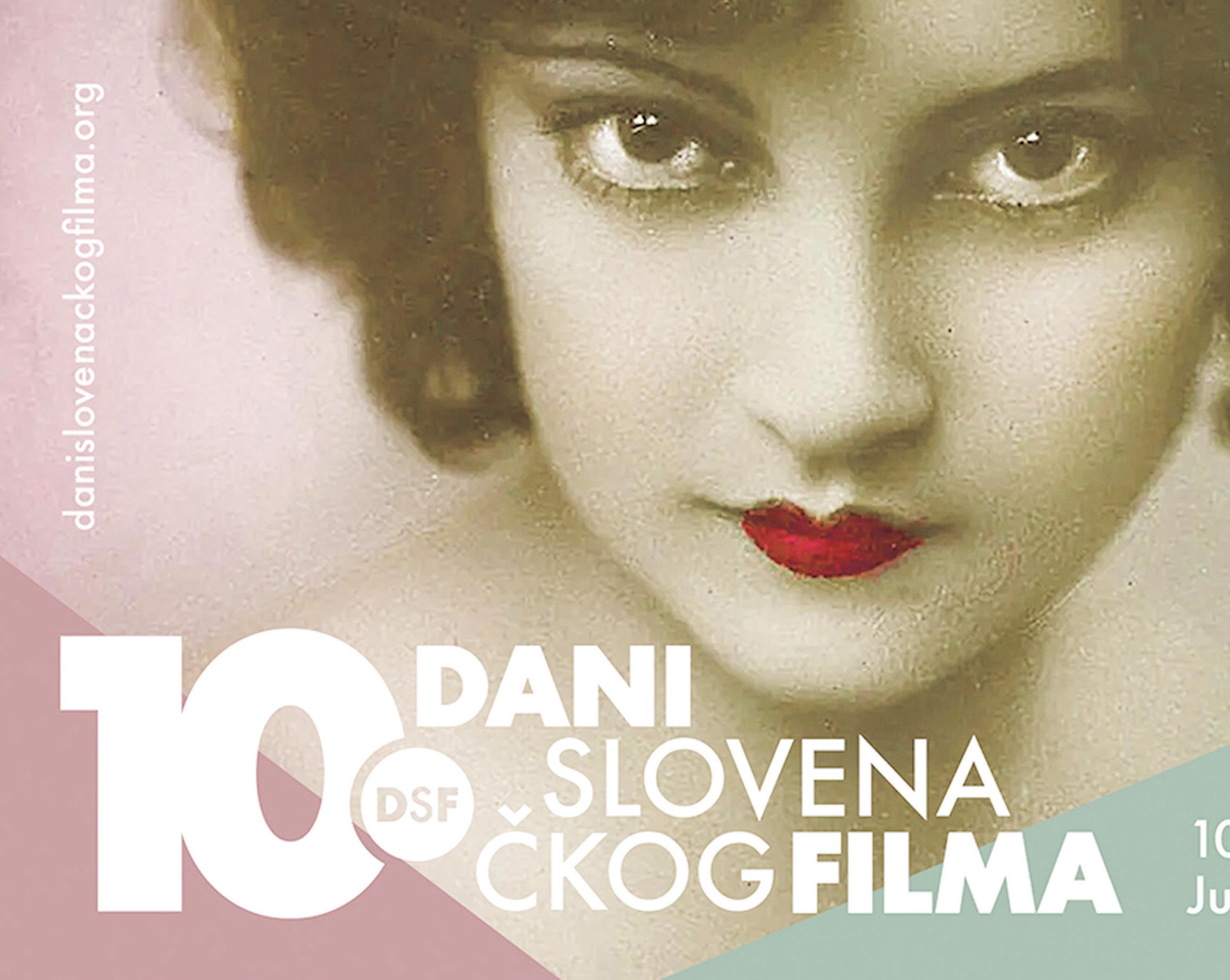
Decade Days Celebrated Anniversary of Slovenian Film
The milestone tenth edition of the Slovenian Film Days, showcasing a retrospective of selected films by Slovenian authors, guests, and participants from 2015 to the present, was held at the Yugoslav Film Archive in May
32 SLOVENIA 2024 32 CULTURE
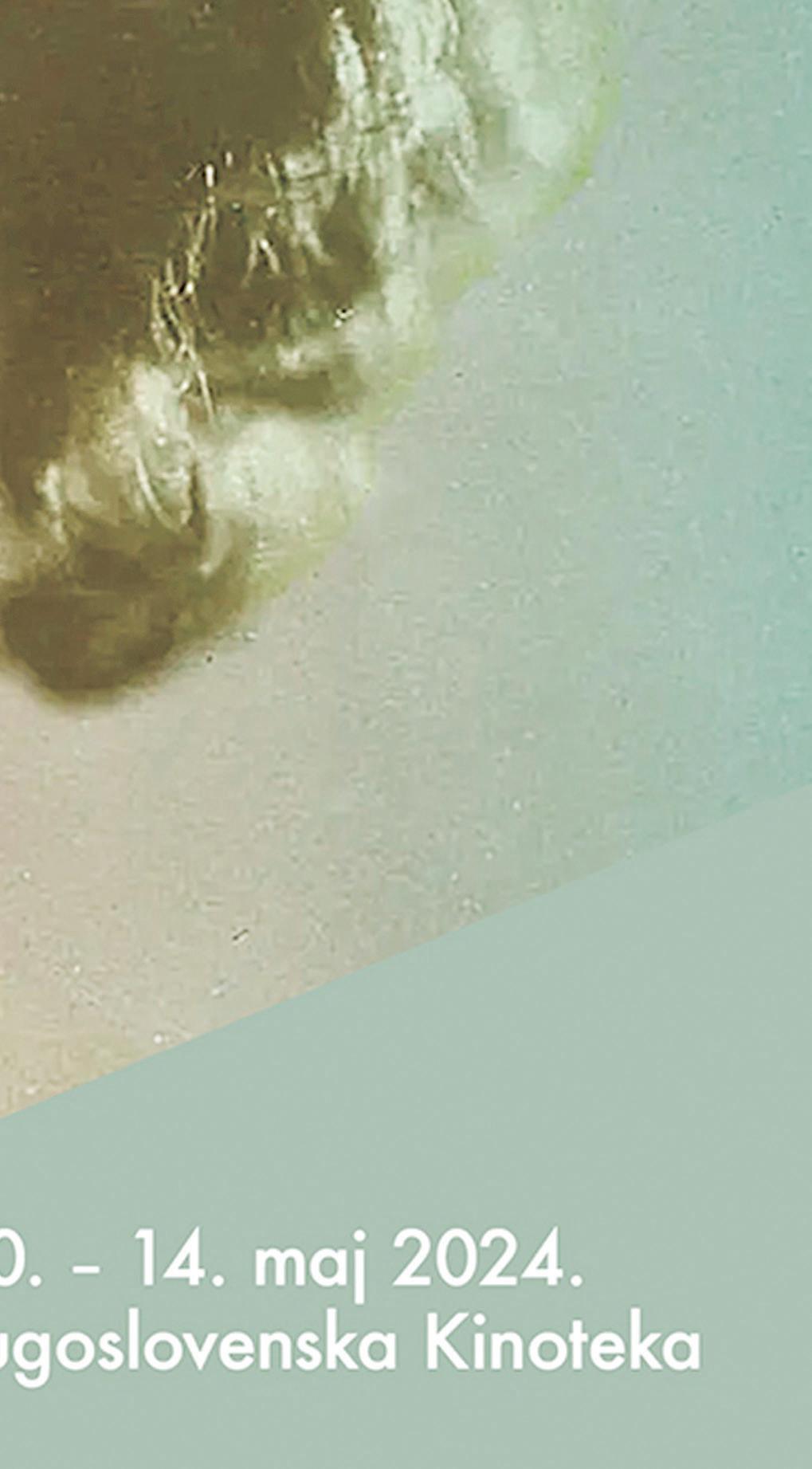
Speakers at the event included H.E. Damjan Bergant, Ambassador of the Republic of Slovenia in Belgrade; Dr. Asta Vrečko, Minister of Culture of the Republic of Slovenia; Saša Verbič, President of the National Council of Slovenians in Serbia; and Jugoslav Pantelić, Director of the Yugoslav Film Archive.
The festival was officially opened by Jure Ivanušič, a prominent Slovenian actor and versatile film author. In his speech, Ivanušič expressed his enjoyment of spending time with colleagues from Serbia and friends from Slovenia.
“As I enjoyed walking the city streets alone in the rain without an umbrella two days ago, I thought about how we live in epic times without
anything epic in us, how music is sold like shaving foam, how all despair is sold—everything is capital, advertisement, and consumers. I want to say that these are the themes Slovenian film deals with and themes with which you can dance in the rain without catching a cold. In short, I wish you to enjoy the screenings, constructive debates, a lot of socialising, and good cheer,” said Jure Ivanušič.
Saša Verbič, President of the National Council of Slovenians in Serbia, thanked the event’s partners and sponsors and presented a plaque to Jugoslav Pantelić, Director of the Yugoslav Film Archive.
After the opening ceremony, two films premiered in the Makavejev Hall of the Yugoslav
The festival was officially opened by Jure Ivanušič, a prominent Slovenian actor and versatile film author.
In his speech, Ivanušič expressed his enjoyment of spending time with colleagues from Serbia and friends from Slovenia
Film Archive. The short documentary “Ita Rina – Diva from Divača” by Vladimir Šojat is about one of the most beautiful and noted actresses of the silent film era who sacrificed a Hollywood career for love in Belgrade. The audience also watched “Caught at the Source – Slovenian Children of Lebensborn” by Maja Weiss, a documentary about the last surviving victims of the Nazi racial experiment. In 1942, thirty “racially suitable” Slovenian children were included in the infamous Lebensborn program, founded by Heinrich Himmler to expand the Aryan race.
An exhibition of posters and photographs from previous editions of the Slovenian Film Days was also organised in the hall of the Yugoslav Film Archive as part of the opening ceremony. The exhibition featured valuable artistic works by photographer Irena Herak, cultural and media advisor at the Embassy of the Republic of Slovenia in Belgrade. From the beginning of the Slovenian Film Days festival, Irena Herak contributed to the visual identity of the event by capturing personalities, events, and artist encounters with her camera.
cordmagazine.com 33
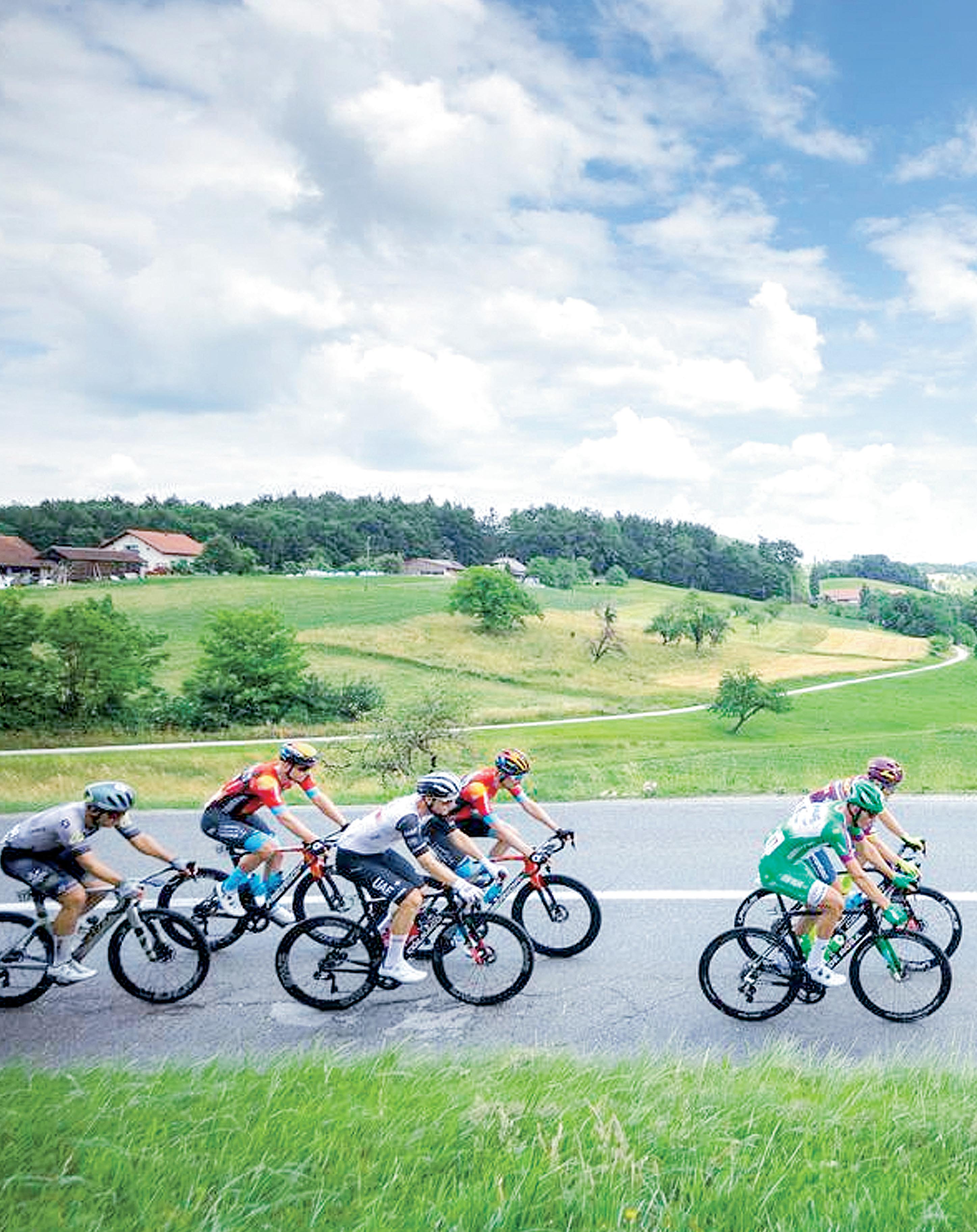
Celebrating 30 Years: The Tour of Slovenia
The Tour of Slovenia is the country’s main cycling event, featuring a top-class field of Slovenian and international professional cyclists. Having hosted many world-class cyclists and teams since its launch more than 30 years ago, the Tour of Slovenia has established itself as an event of international stature. The winners of the race include Slovenian aces and currently two of the world’s top cyclists, Primož Roglič and Tadej Pogačar. Throughout its rich history, the race has become a unique sporting event
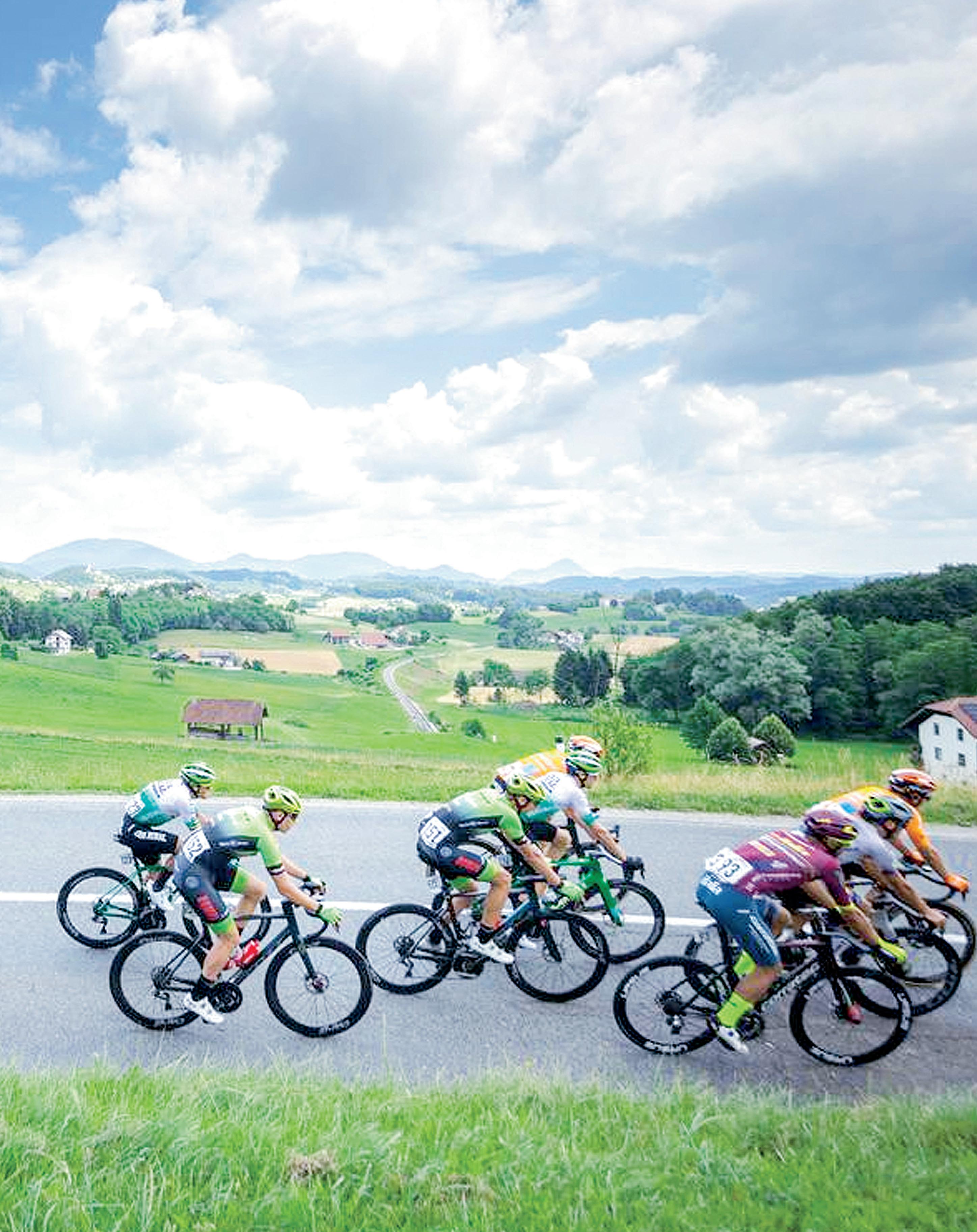
that, with its varied stage routes, connects places across Slovenia and attracts large crowds of spectators, both on the roadside and in front of TV screens, spreading the good word about Slovenia and its image as a boutique and green country.
Although it officially celebrated its 30th anniversary last year, the 2024 Tour of Slovenia is the 30th edition of the race. The race has been cancelled only once. In 2024, cyclists will race in Slovenia between 12 and 16 June.
Bridging the Economies of Serbia and Slovenia
The Slovenian Business Club (SPK) is a business association that, for over two decades, has acted as a stable bridge between the economies of Serbia and Slovenia, providing strong support to its members in all their activities and business ventures. One of the key factors that has made SPK enduring is its continuity in operations and the constant engagement and support of its members.
The club, with its 150 members, is a hub of activity, successfully organizing more than 20 events each year. These include working breakfasts with the most current topics, regional conferences, networking events, and many other meetings. These
events are not just opportunities for members to stay updated with the latest information from the business environment but also platforms for direct communication and networking, fostering valuable connections and collaborations.
In April 2024, the club embarked on its 22nd year of operation, filled with anticipation for the diverse activities and ample support for companies ahead. The coming period promises a wealth of events within traditional and proven formats, supplemented by new formats that align with trends and needs, offering our members exciting opportunities for growth and development.
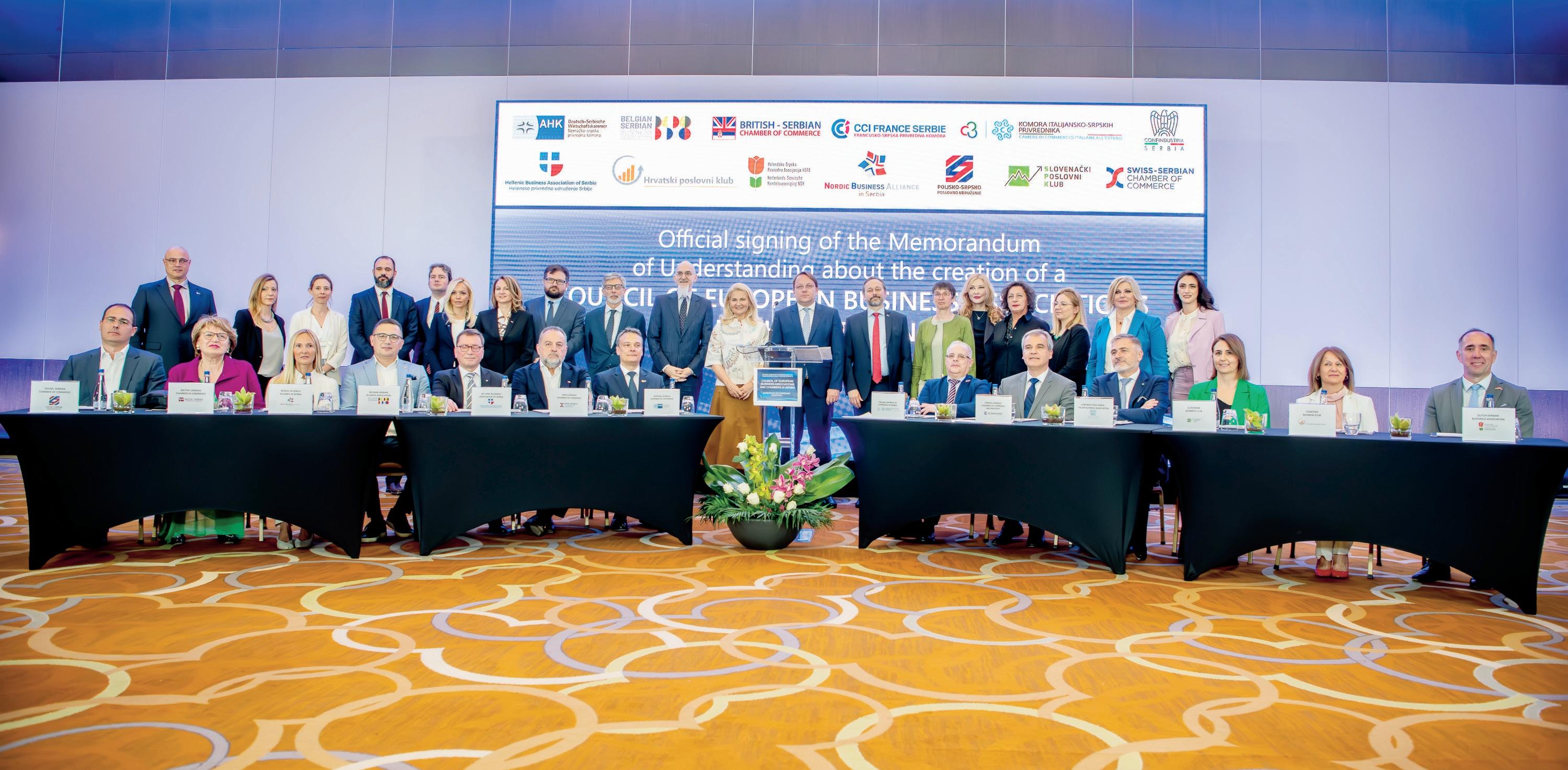
MAY
2024
ESTABLISHMENT OF THE COUNCIL OF EUROPEAN BUSINESS ASSOCIATIONS AND CHAMBERS IN SERBIA
European business associations and bilateral chambers representing companies with European capital in Serbia, including the Slovenian Business Club, joined forces to establish the Council of European Business Associations and Chambers in Serbia. The signing of the memorandum marks the beginning of a new era of cooperation and synergy for the European business sec-
tor in Serbia. This newly established body will define common interests and serve as a platform for all future initiatives and activities. The signing was carried out at the Hyatt Regency Belgrade Hotel in the presence of the European Commissioner for Enlargement, Oliver Varhelyi, and ambassadors from the member association countries. In addition to the Slovenian Business Club, the memorandum was also signed by the following organisations: Belgian-Serbian Business Association, Confindustria Serbia, Croatian Business Club, French-Serbian Chamber of Commerce, British-Serbian Chamber of Commerce, Hellenic Business Association of Serbia, Italian-Serbian Chamber of Commerce, Dutch-Serbian Business Association, Polish-Ser-
36 SLOVENIA 2024 SLOVENIAN BUSINESS CLUB ACTIVITIES |
bian Chamber of Commerce, German-Serbian Chamber of Commerce, Nordic Business Alliance, Swiss-Serbian Chamber of Commerce. The same day, a celebration and the council’s first official event, the European Networking Cocktail, was organised. The event gathered over 200 guests from the diplomatic and business world, including many members of the Slovenian Business Club.
APRIL 2024 CEO GATHERING
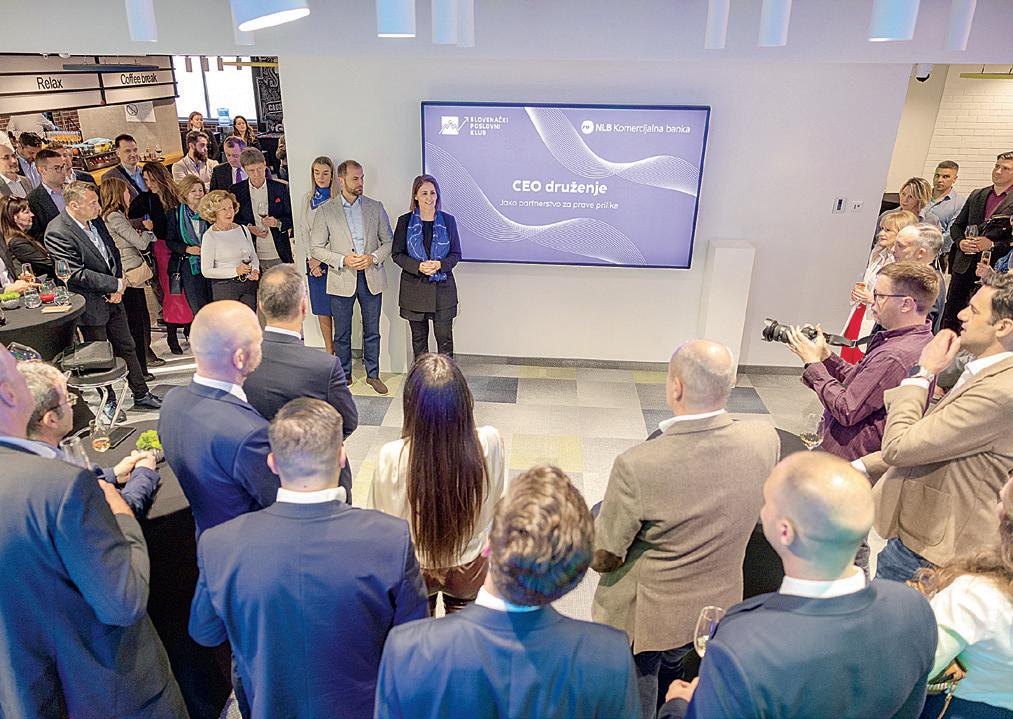
In collaboration with its member and friend of the club, NLB Commercial Bank, the SPK organised a CEO gathering in the new setting of the NLB Commercial Bank building. This exclusive event brought together over 60 CEOs and company owners for networking and idea exchange. Speakers included Danijela Fišakov, President of the Slovenian Business Club; Vladimir Bošković, Board Member of NLB Commercial Bank; and His Excellency Damjan Bergant, the Ambassador of the Republic of Slovenia to Belgrade. After the welcoming speeches, members had the opportunity to exchange business visions and experiences in a friendly atmosphere, creating potential new contacts for developing and expanding professional networks.
MARCH 2024
WORKING BREAKFAST: “IMPACT OF THE AMENDMENTS TO THE FOREIGNERS ACT AND THE EMPLOYMENT OF FOREIGNERS ACT”
In collaboration with the CANSEE Canadian-Serbian Business Association and TSG Lawyers Belgrade law firm, a Working Breakfast was organised on the topic “What do the amendments to the Foreigners Act and the Employment of Foreigners Act bring us? Dilemmas and challenges in practice”. The Working Breakfast was held at the Holiday Inn Hotel, with the presence of representatives from relevant state authorities and a
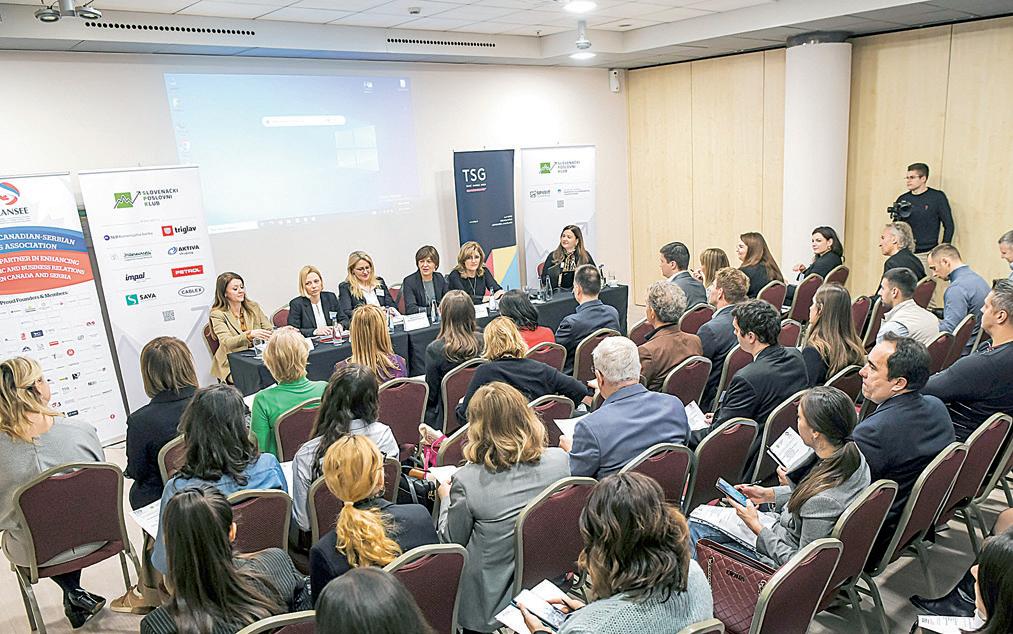
large number of members, as well as foreign embassies, consultants, and legal advisers. Representatives from the Ministry of the Interior, Ministry of Labour, Employment, Veteran and Social Affairs, and the Office for Information Technologies and Electronic Administration spoke on this very topical issue, which includes changes in regulating the immigration status of foreigners in the Republic of Serbia and examples from practice. Participants had the opportunity to hear from panellists, who possess significant experience in this area, about the new rules for the employment of foreigners in Serbia and exchange dilemmas and challenges from practice. After the lecture, in an informal atmosphere, the discussion continued on all open questions and expectations about the results that the changes will bring.
INTERNATIONAL COFFEE BREAK KOPAONIK
In collaboration with the British-Serbian Chamber of Commerce, German-Serbian Chamber of Commerce, Chamber of Italian-Serbian Businessmen, and Nordic Business Alliance, the Slovenian Business Club organised the “INTERNA-
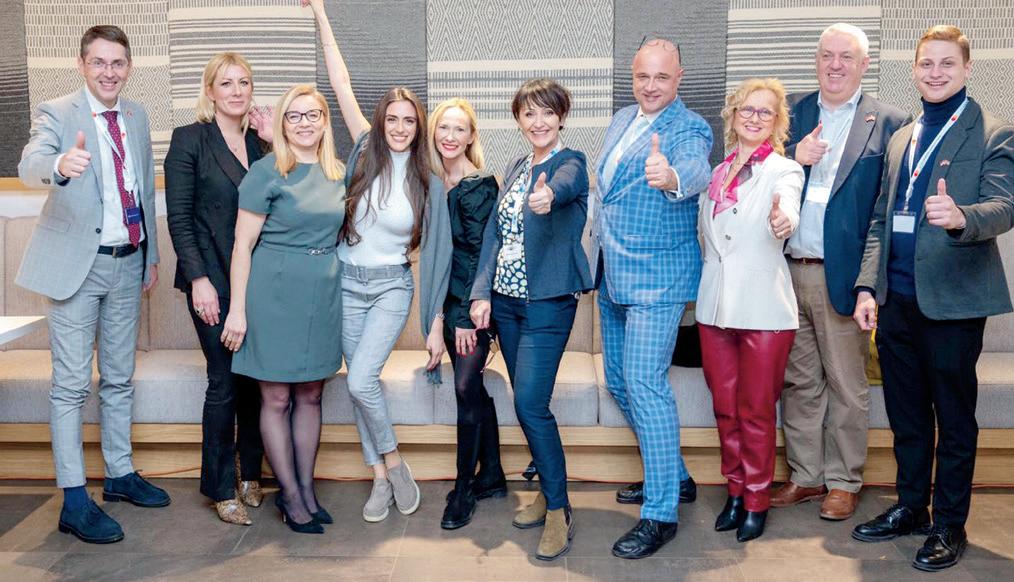
TIONAL COFFEE BREAK”, a special networking event within the Kopaonik Business Forum. Over 100 members, representatives of the business community and companies from various business sectors gathered at the fifth consecutive event - International Coffee Break at Casa Restaurant of the Grand Hotel.
cordmagazine.com 37
Forum participants had the opportunity for informal networking, sharing experiences and ideas, creating new business contacts, and interacting with members from other business associations in Serbia, providing insights into collaboration opportunities, activities, and company plans. This initiative was the result of collaboration among five bilateral chambers in Serbia, aimed at enhancing the business climate through mutual connection and cooperation.
DECEMBER 2023
NEW YEAR’S GATHERING AND 20TH ANNIVERSARY CELEBRATIONSLOVENIAN BUSINESS CLUB
The Slovenian Business Club celebrated its landmark 20th anniversary at the Hyatt Regency Hotel in Belgrade. The traditional New Year’s gathering brought together over 200 guests
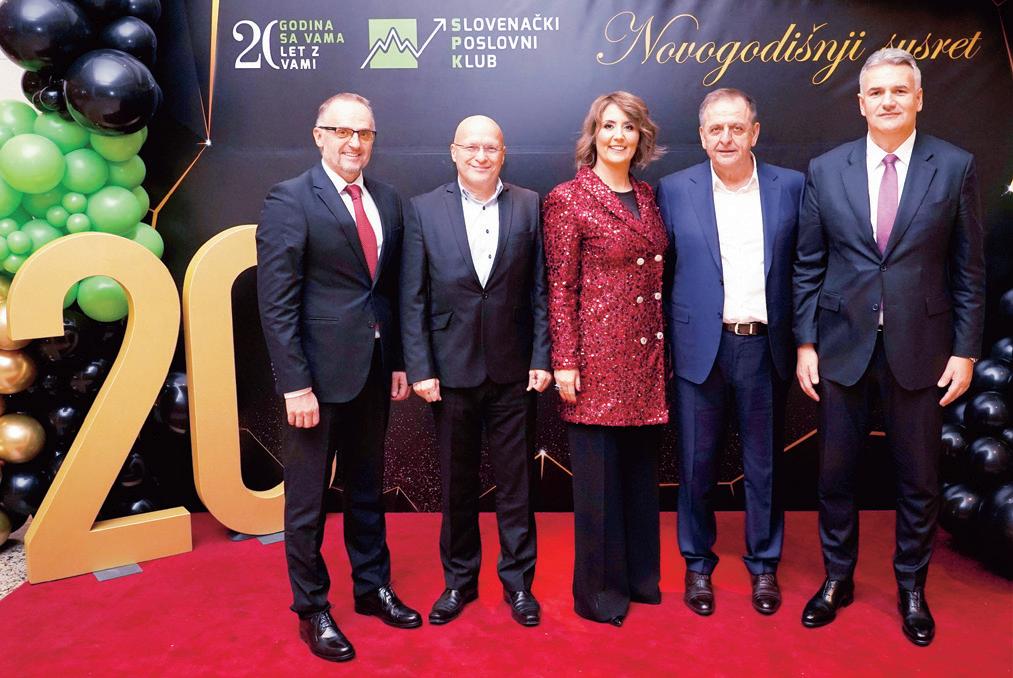
to celebrate this impressive milestone and all past business successes. Members, friends, representatives of the Embassy of the Republic of Slovenia in Serbia, and representatives from many other companies were addressed in the opening part by the club president Danijela Fišakov, as well as His Excellency Damjan Bergant, Ambassador of the Republic of Slovenia to Belgrade. For significant contributions and great support, SPK extended thanks to the state institutions of both countries and to the most loyal member companies that have been a support and foundation in the business and development of the club from the very beginning.
OCTOBER 2023
SPEED BUSINESS MEETING
The Speed Business Meeting at Mona Plaza Hotel was held in collaboration with the Slovenian Business Club, CANSEE Canadian-Serbian Business Association, Chamber of Italian-Serbian Businessmen CCIS, AmCham, British-Serbian Chamber of Commerce BSCC, and Swiss-Serbian Chamber of Commerce.
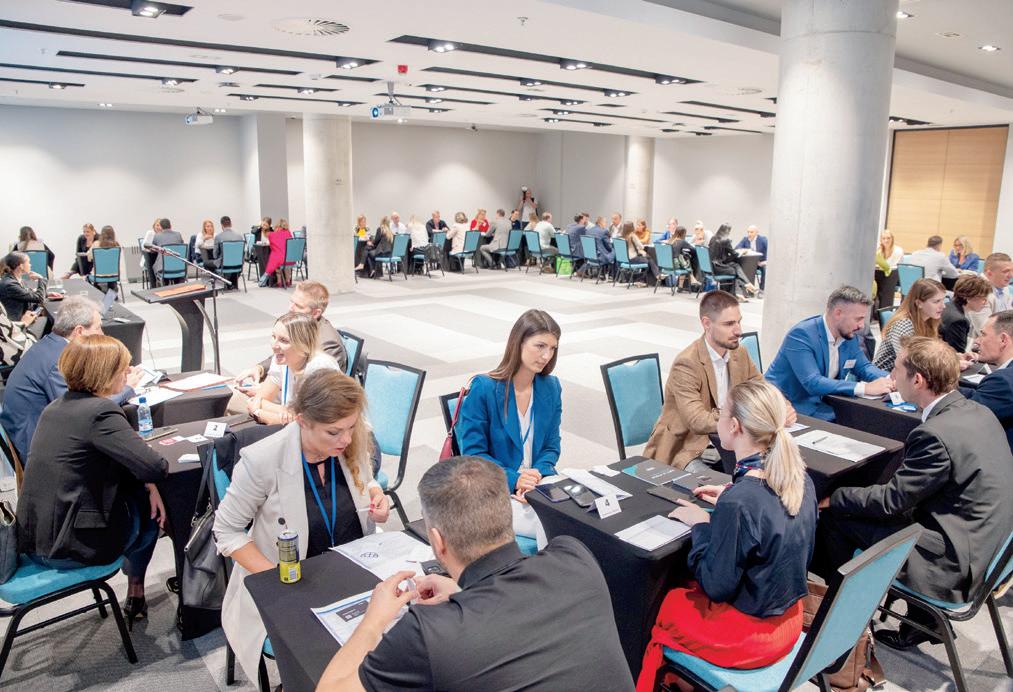
The event gathered 70 representatives from member companies across various business sectors intending to connect foreign and domestic businessmen. During the 10 quick and efficient eight-minute “one-on-one” meetings, participants had a unique opportunity to present their company, establish a large number of business contacts, and initiate possible new business projects.
SECOND REGIONAL CONFERENCE LOGISTICS AND TRANSPORT: AT THE HEART OF THE ECONOMY
SPK held the conference “Transport and Logistics: At the Heart of the Economy” in partnership with the Association of Italian Industrialists-Confindustria Serbia, the Chamber of Commerce and Industry of Serbia, and the Croatian Chamber of Economy at the Chamber of Commerce and Industry of Serbia, attended by over 200 businessmen from four countries. The conference was organised through interactive and dynamic panels, which aimed to offer innovative solutions and new strategies while also identifying critical issues concerning the transport and logistics sector. Participants had the honour of being ad-
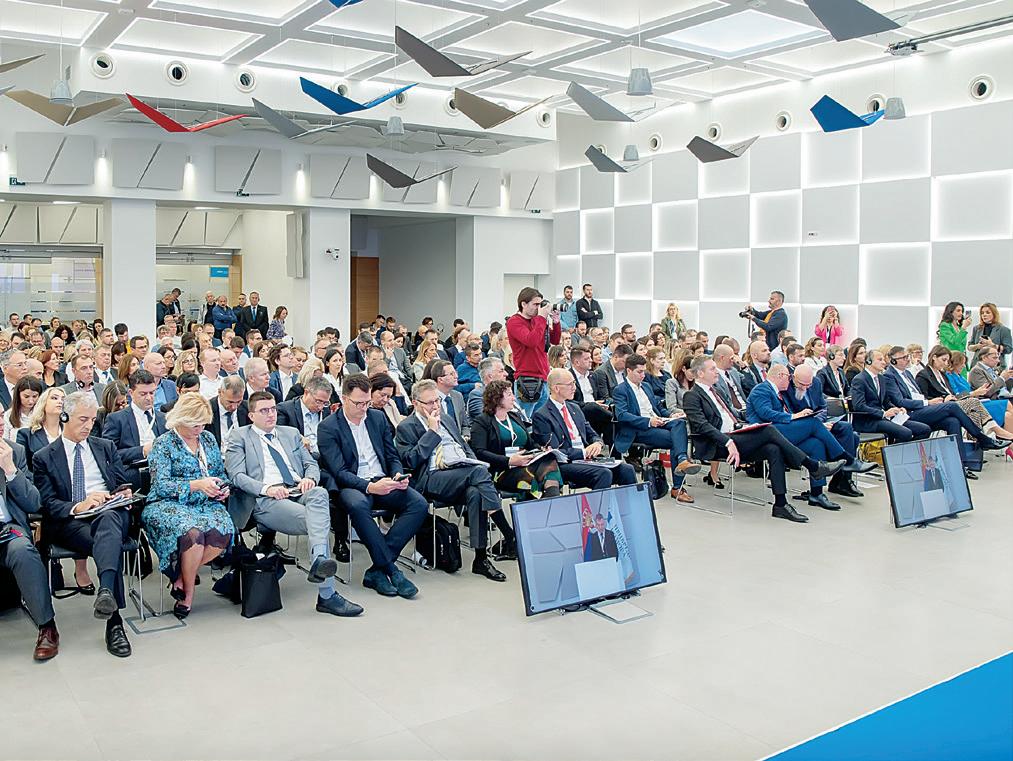
38 SLOVENIA 2024 SLOVENIAN BUSINESS CLUB ACTIVITIES |
dressed by His Excellency Damjan Bergant, Ambassador of the Republic of Slovenia to Belgrade, and Goran Vesić, Minister of Construction, Transport and Infrastructure.
SEPTEMBER 2023 INTERNATIONAL NETWORKING COCKTAIL
Continuing the tradition of gathering representatives of prestigious companies in Serbia, organised with as many as 16 bilateral chambers of commerce and business associations, SPK organised an “International Networking Cocktail” at the Metropol Hotel in Belgrade, which brought together more than 350 company representatives from member associations. Cocktail participants were representatives from a wide range of industries and sectors, members of the Slovenian Business Club and bilateral associations present in Serbia, including the Belgian-Serbian Business Association, British-Serbian Chamber of Commerce, Brazilian-Serbian Chamber of Commerce, CAN-
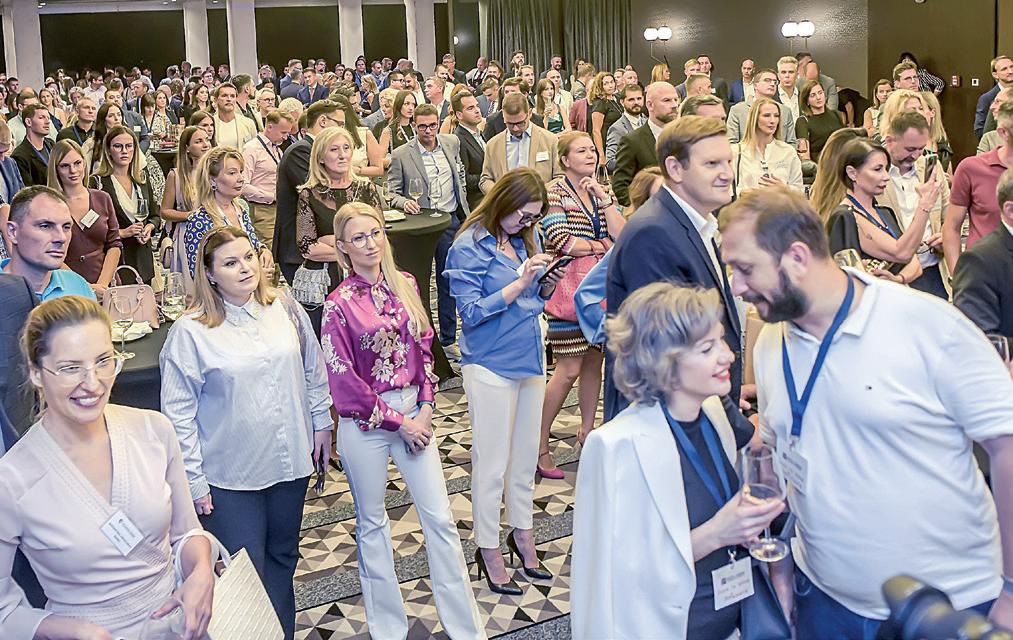
SEE Canadian-Serbian Business Association, French-Serbian Chamber of Commerce, Hellenic Business Association of Serbia, Dutch-Serbian Business Association, Croatian Business Club, Irish-Serbian Chamber of Commerce, Japanese Business Alliance in Serbia, Chamber of Italian-Serbian Businessmen, German-Serbian Chamber of Commerce, Nordic Business Alliance, Business Club UAE & Serbia, Swiss-Serbian Chamber of Commerce, Confindustria Serbia.
JUNE 2023
BUSINESS CONFERENCE ON SLOVENIAN TRANSPORT LOGISTICS
In partnership with the Chamber of Commerce and Industry of Slovenia (Association for Transport and Centre for International Business), the SPIRIT Slovenia agency, Slovenian Railways, the Port of Koper, and with the support of the Chamber of Commerce and Industry of Serbia, SPK organised a Business Conference on Transport Logistics - a Slovenian logistics conference for the needs of the Serbian economy and market,
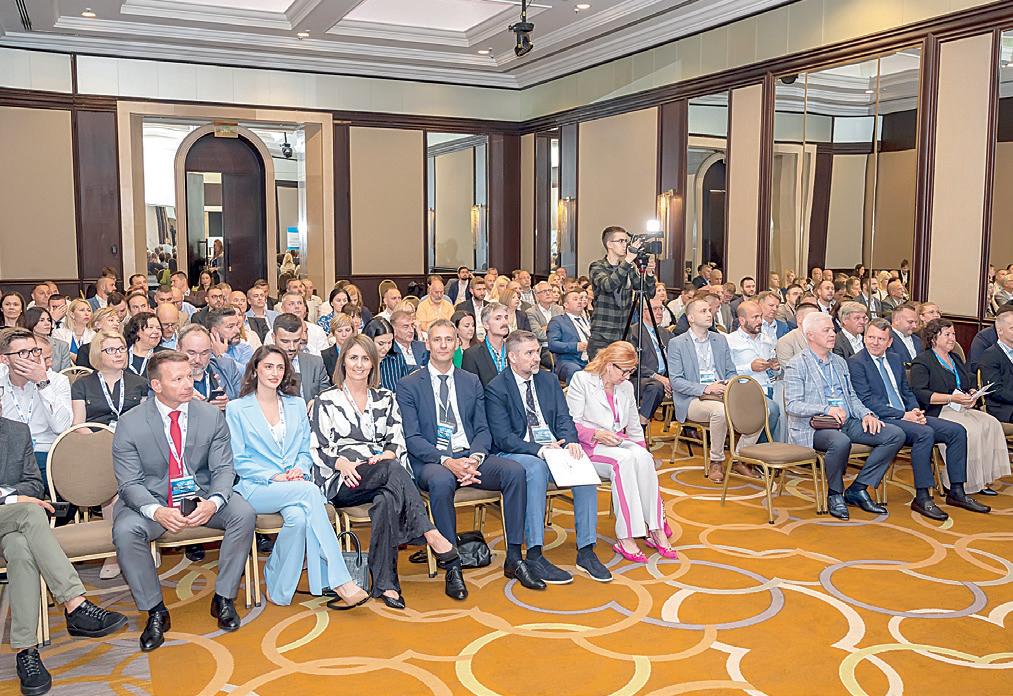
attended by a business delegation of more than 30 Slovenian companies, with over 120 businessmen participating.
The purpose of the Slovenian delegation was to present and promote the competencies, capacities, and services of the Slovenian transport and logistics sector for the needs of Serbia and the region, thereby reviving Slovenia’s significance and leading role and encouraging greater cooperation between the Western Balkans and the rest of Europe.
MAY 2023
REGIONAL CONFERENCE - BUSINESS WITH A PURPOSE
The regional conference Business with a Purpose, under the slogan “The whole region—one conference,” was organised in collaboration with SPK and its member D.R. Gil -
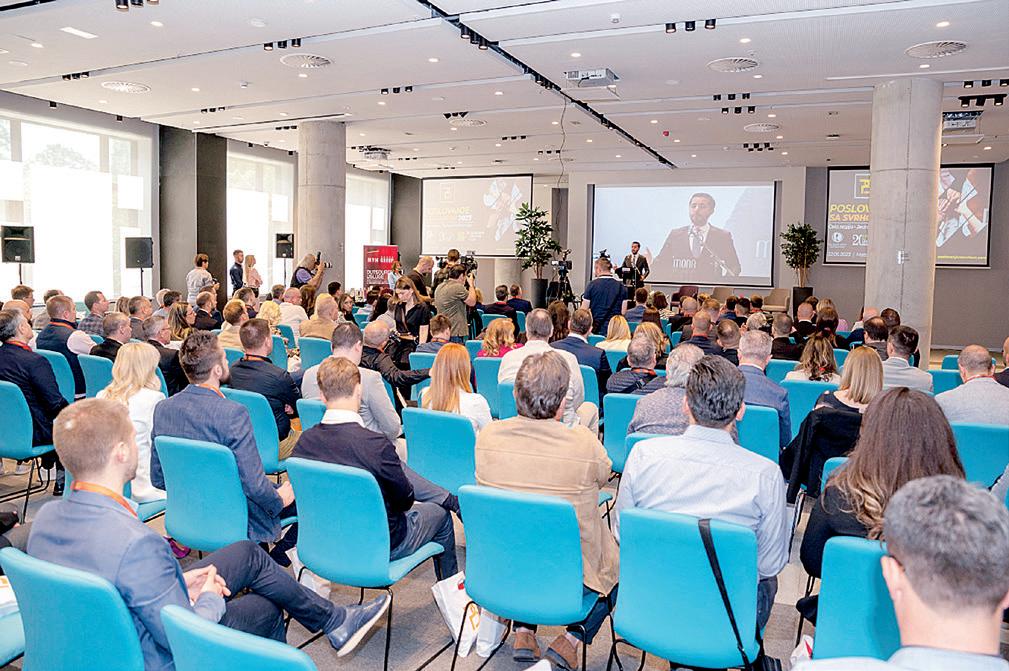
bert Center Group at the Mona Plaza hotel in Belgrade. To the great satisfaction of all present, the Minister of Internal and Foreign Trade, Tomislav Momirović, addressed the introductory part.
The conference gathered over 200 participants and 30 speakers, providing opportunities for inspiring lectures, panel discussions, and informal networking, promoting ideas about regional connection and cooperation.
cordmagazine.com 39
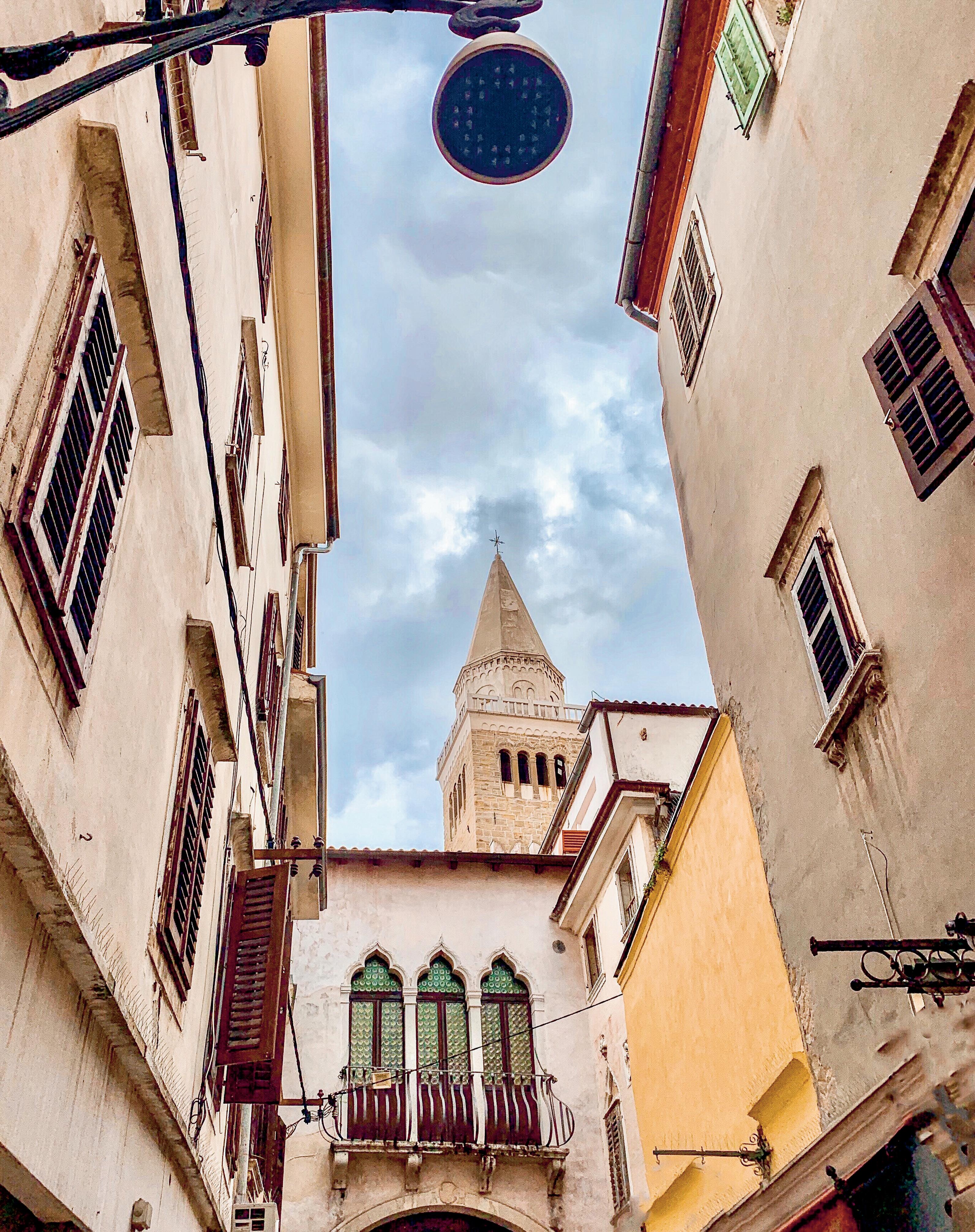






















 Peter Grk National Coordinator For Western Balkans, Ministry Of Foreign Affairs Of Slovenia
Peter Grk National Coordinator For Western Balkans, Ministry Of Foreign Affairs Of Slovenia

































